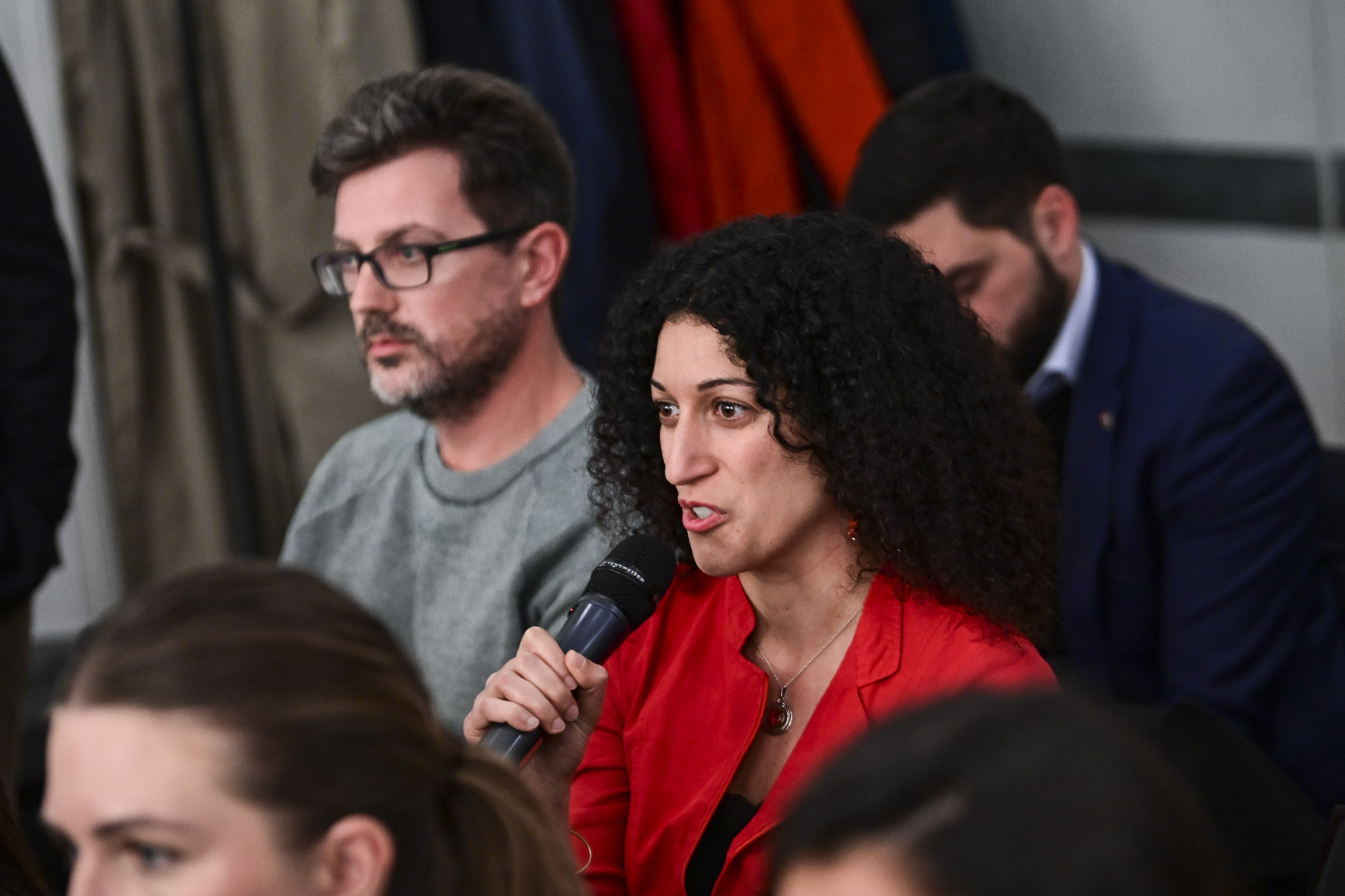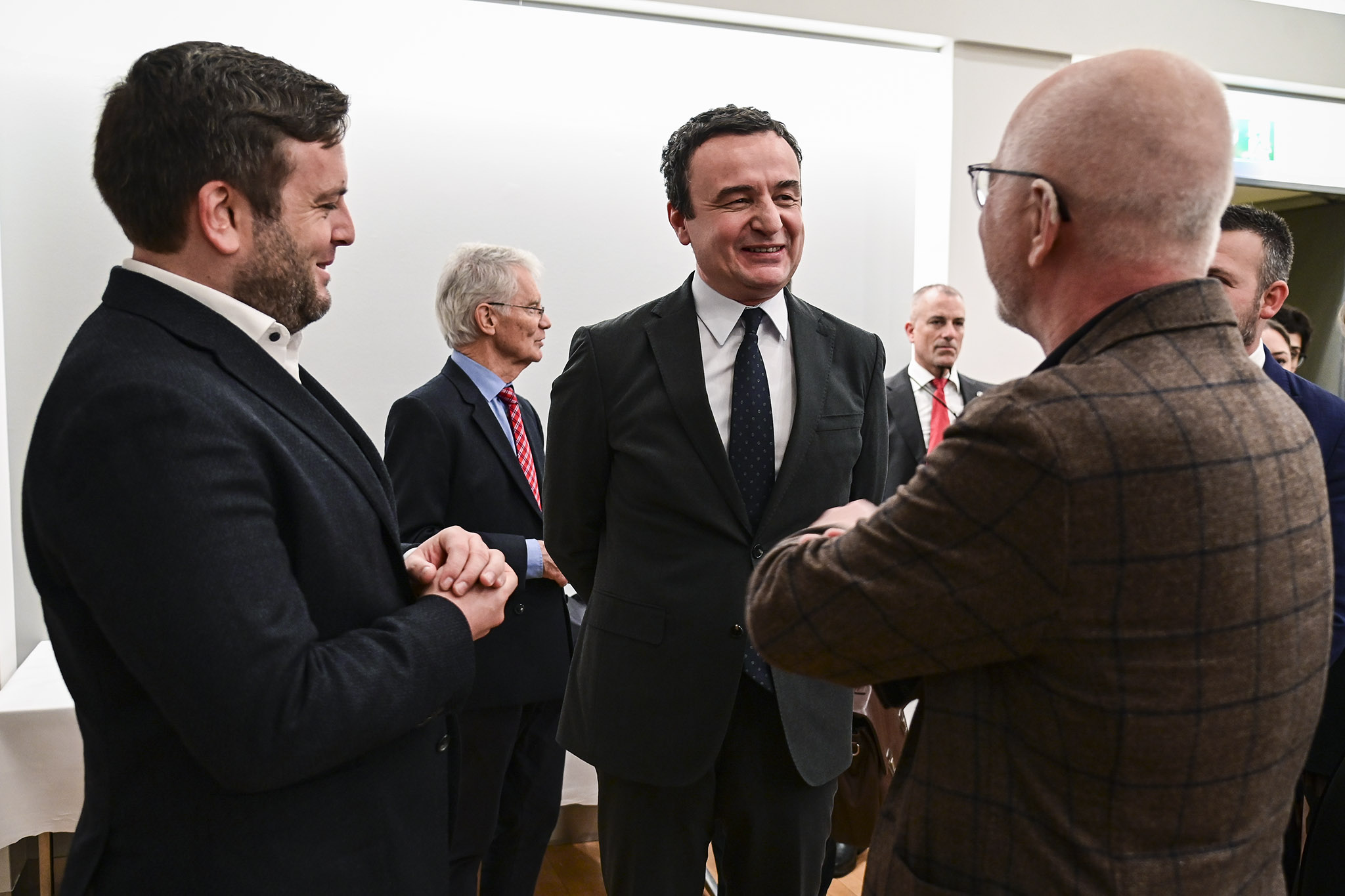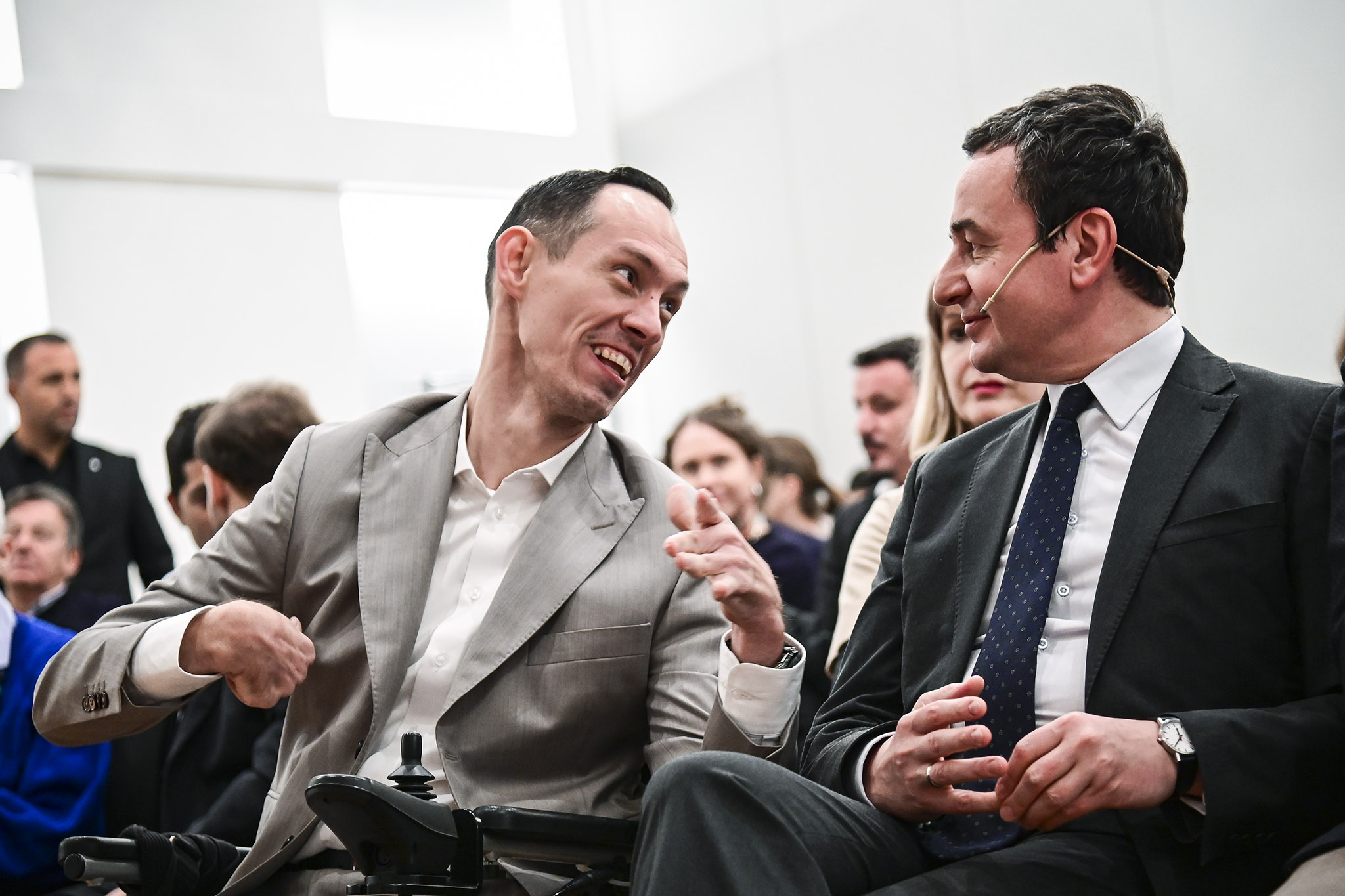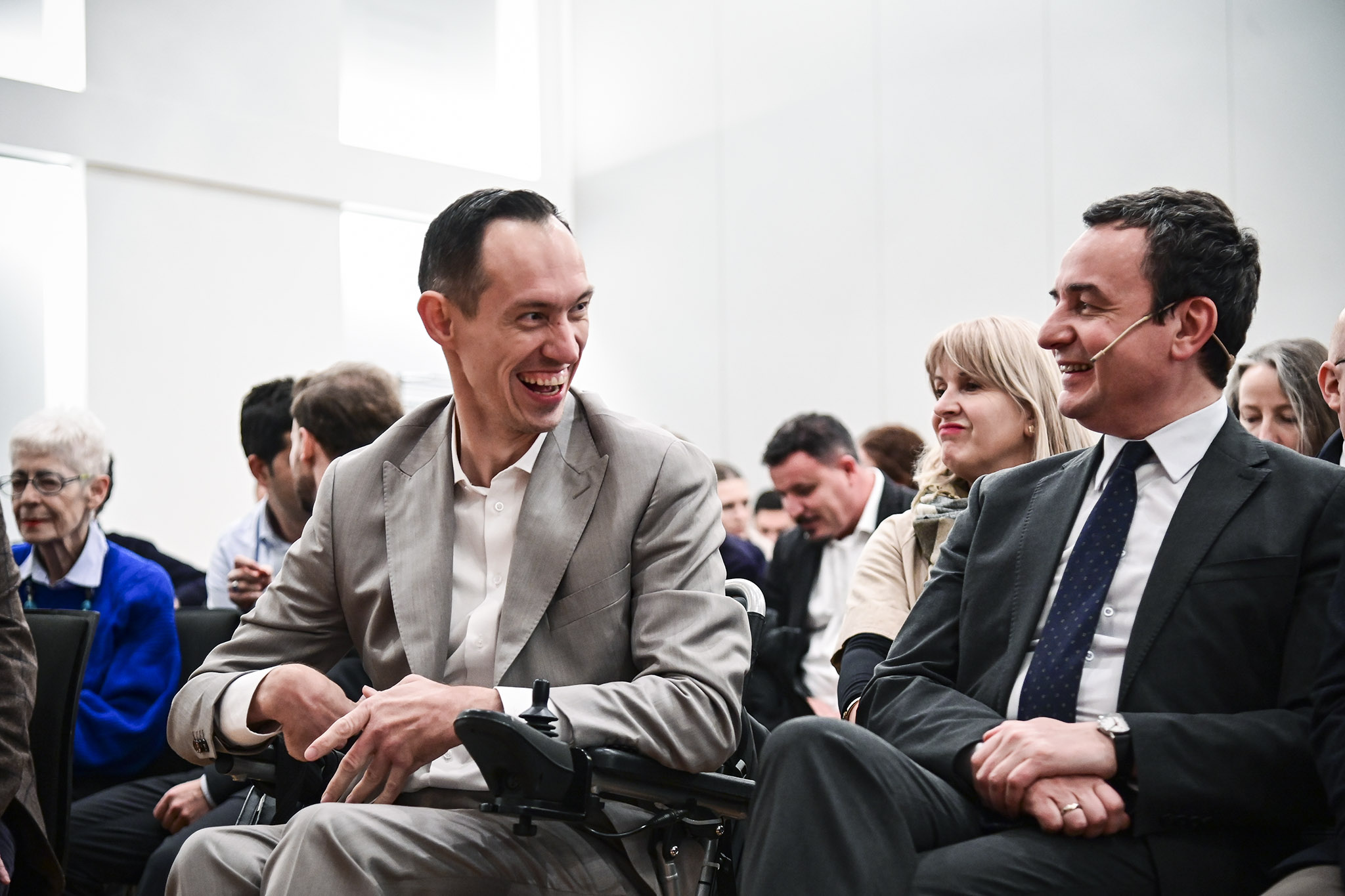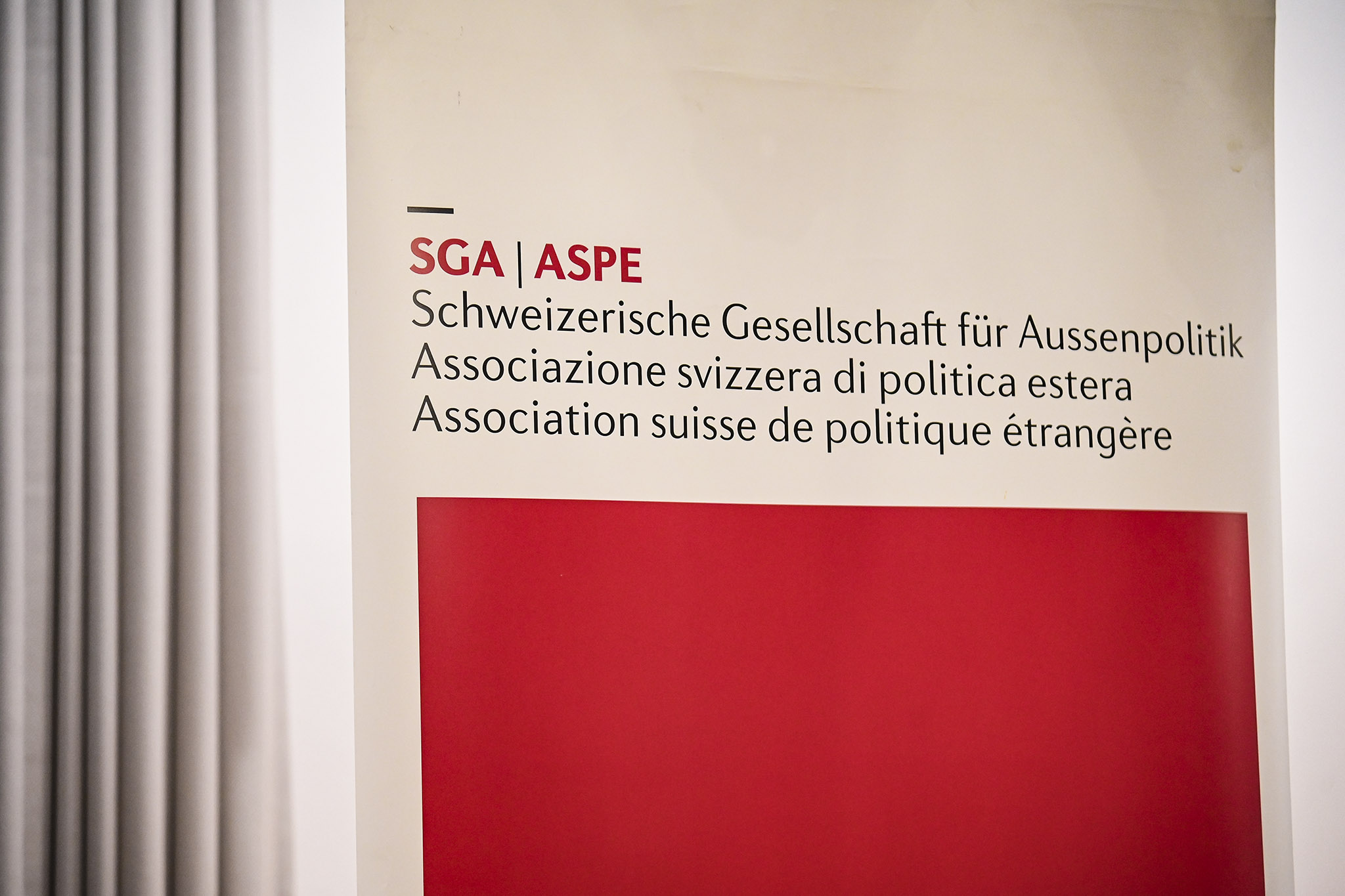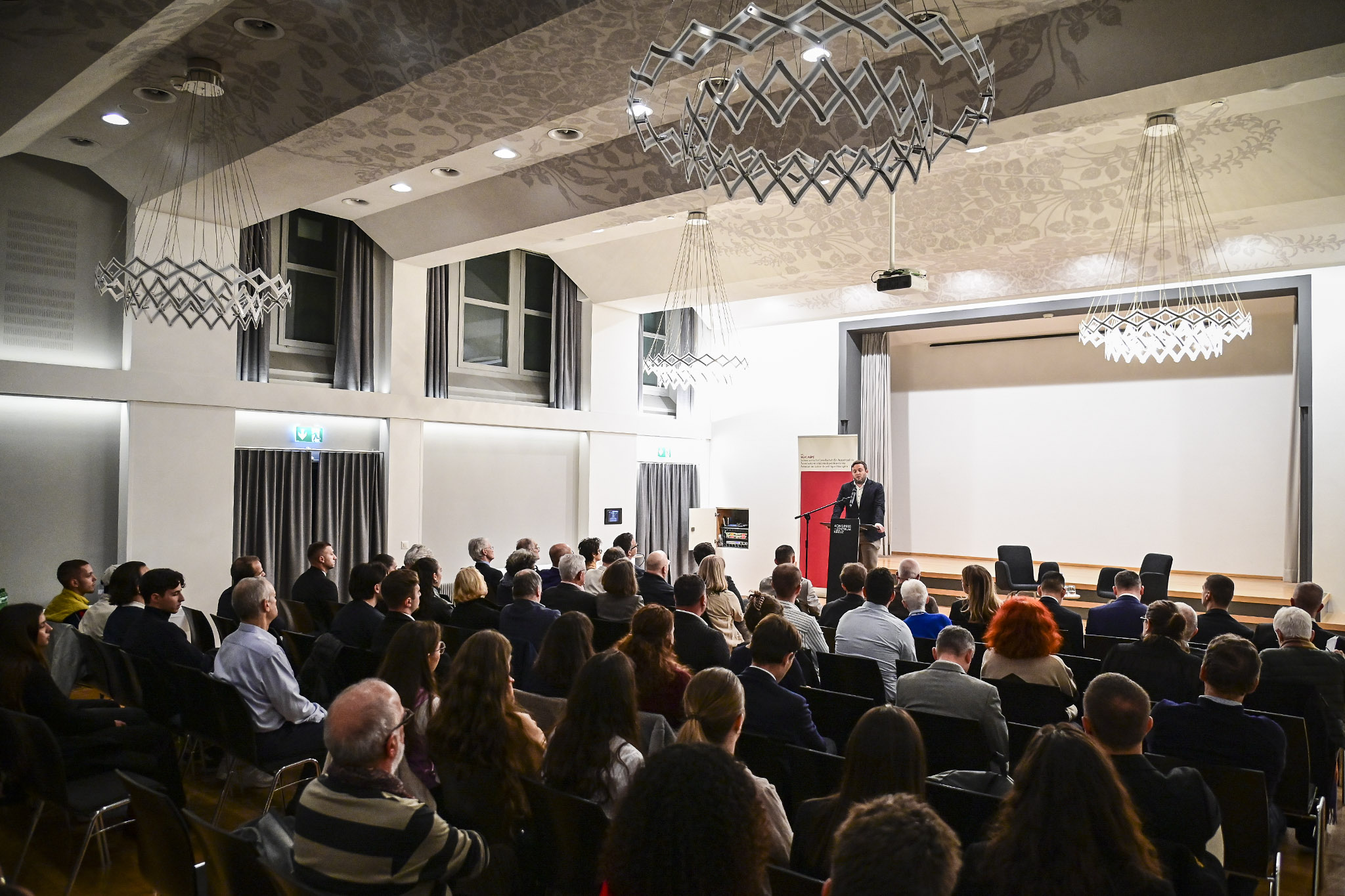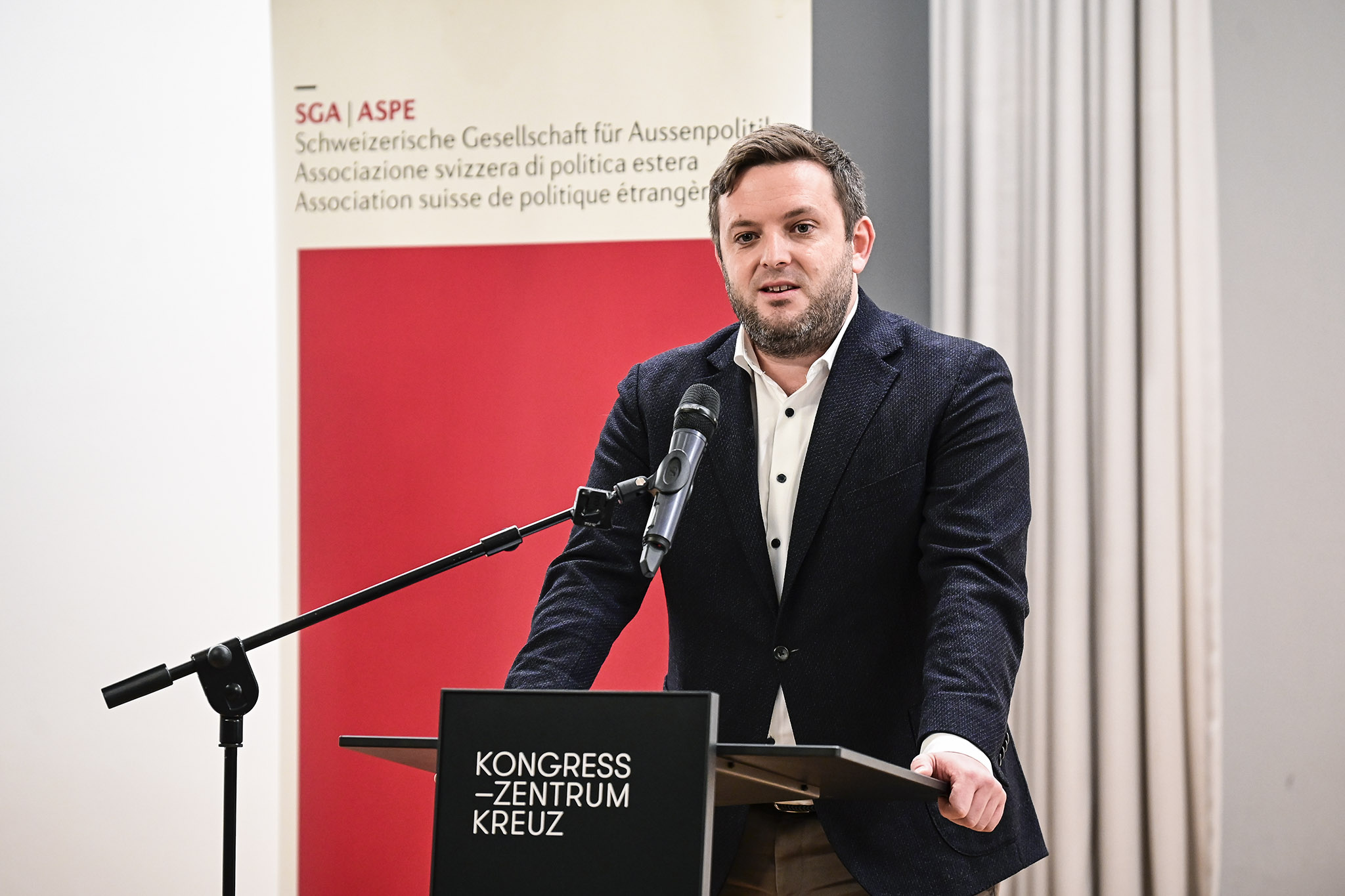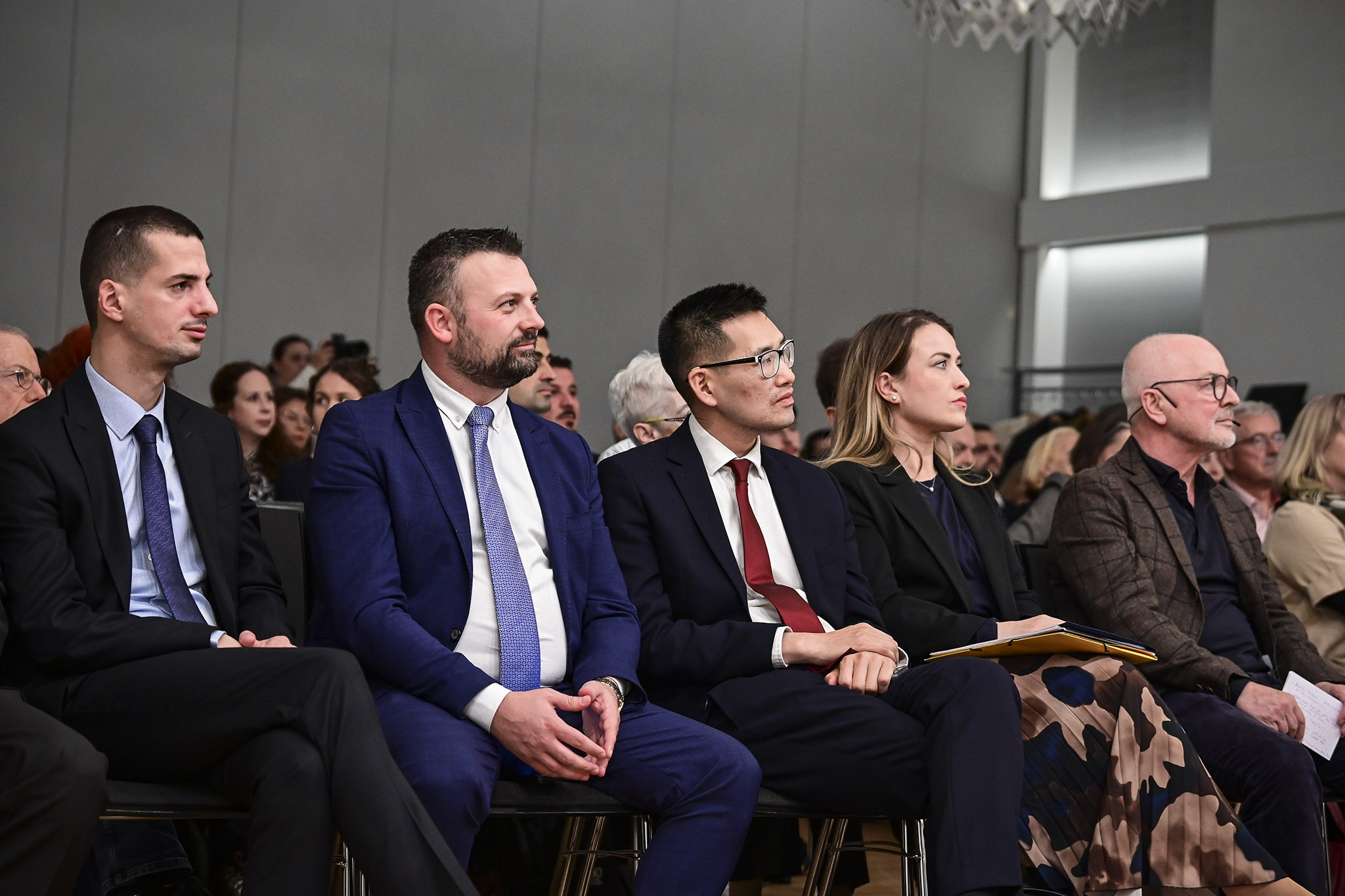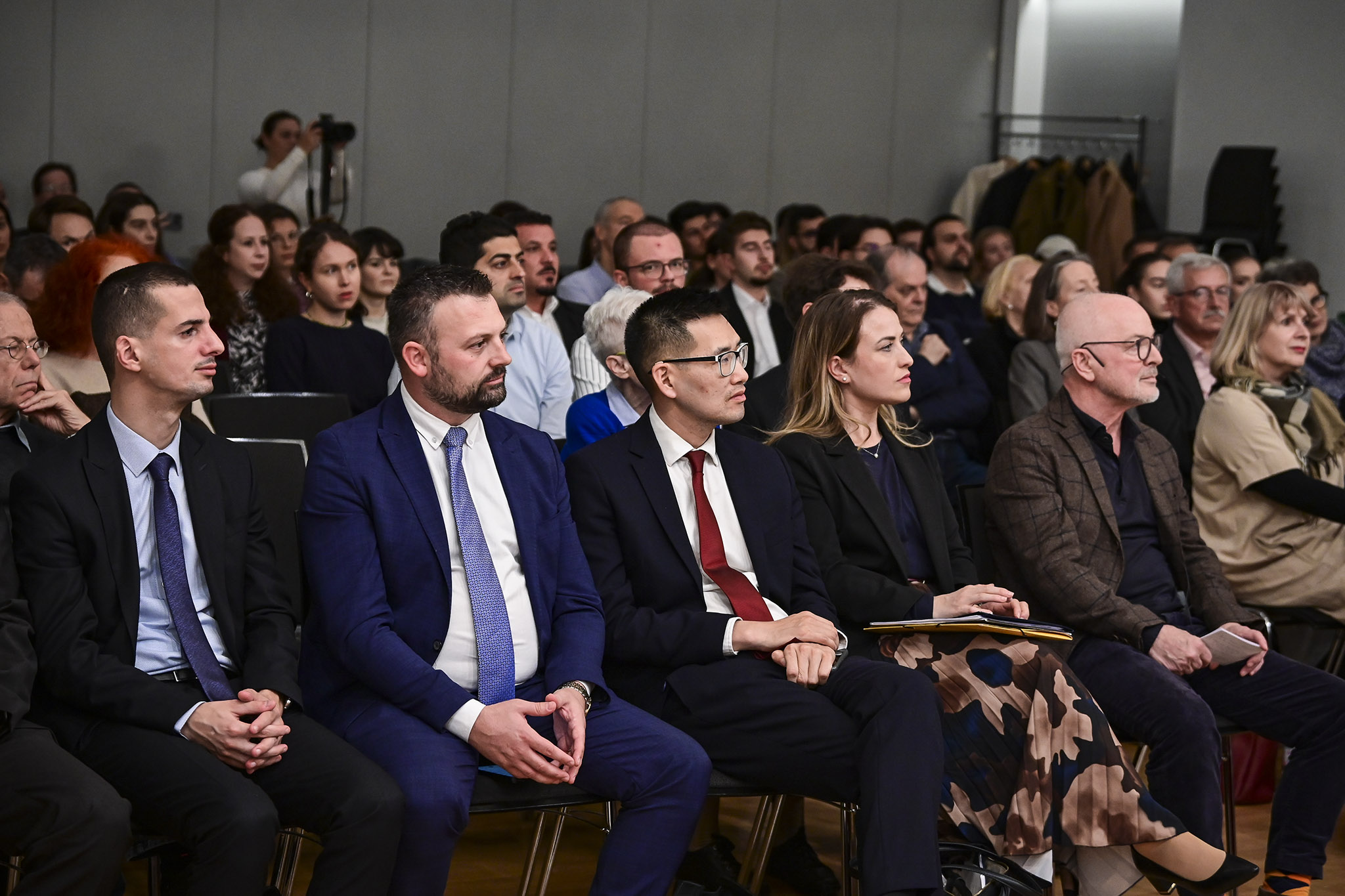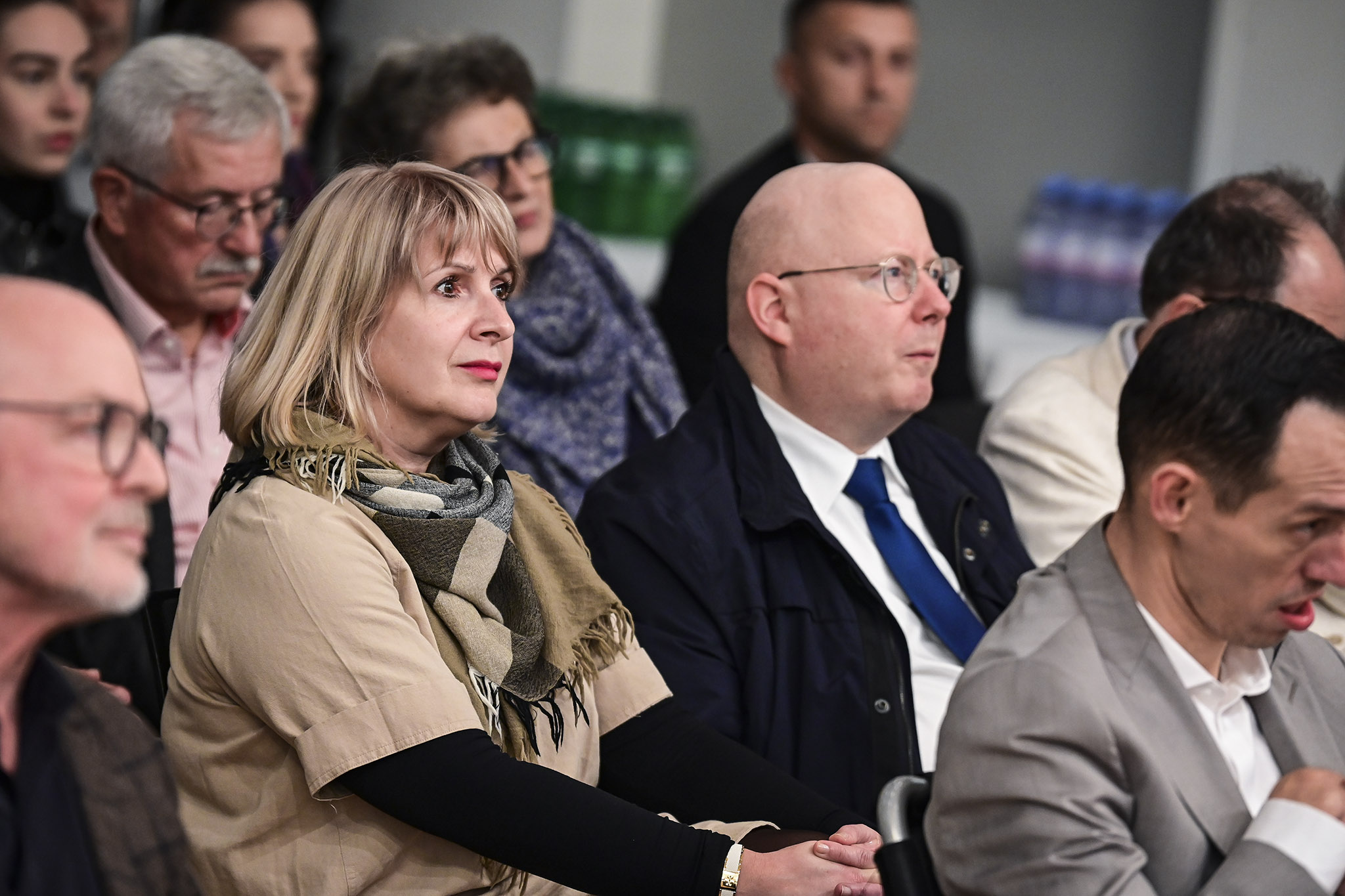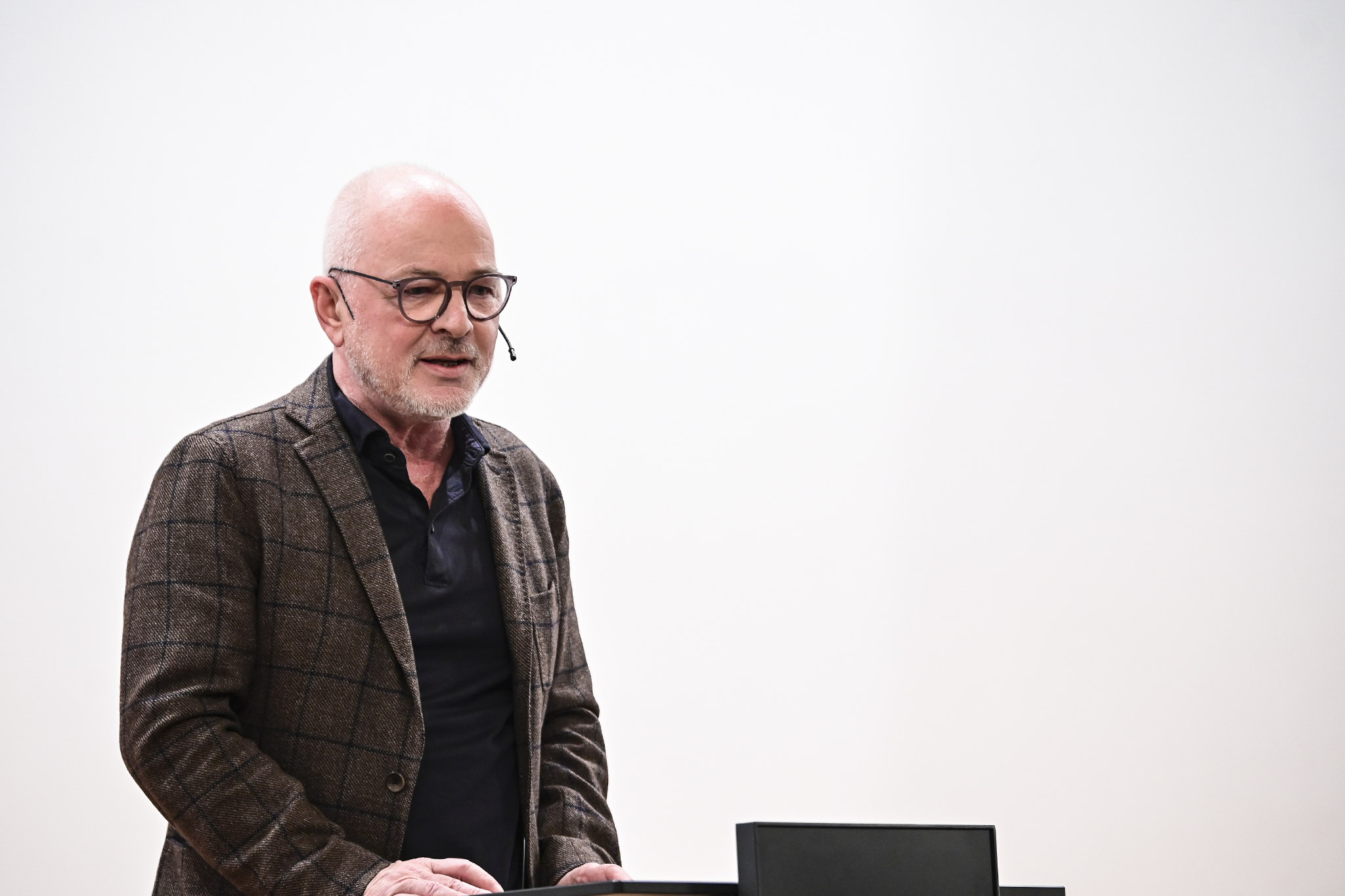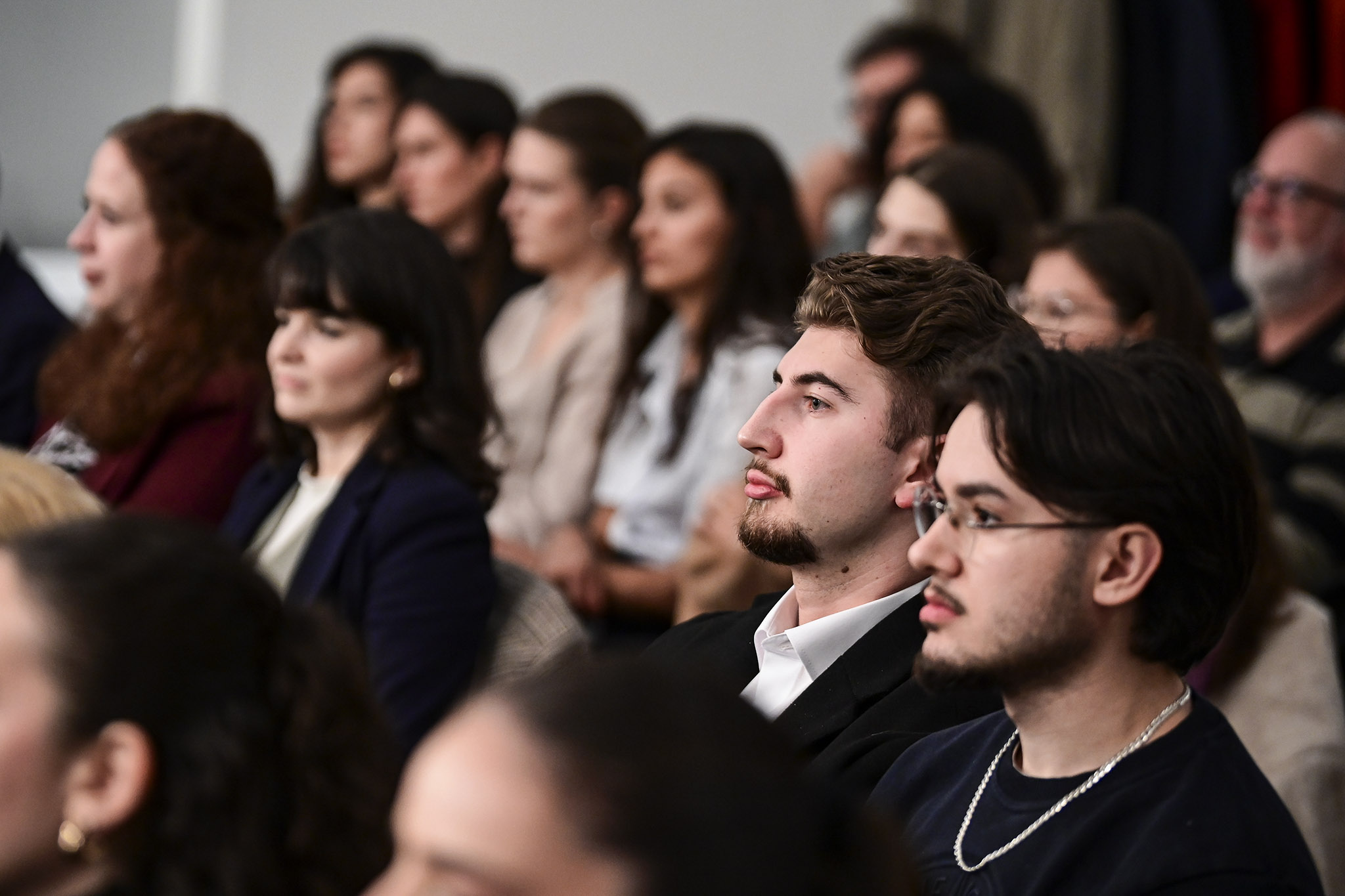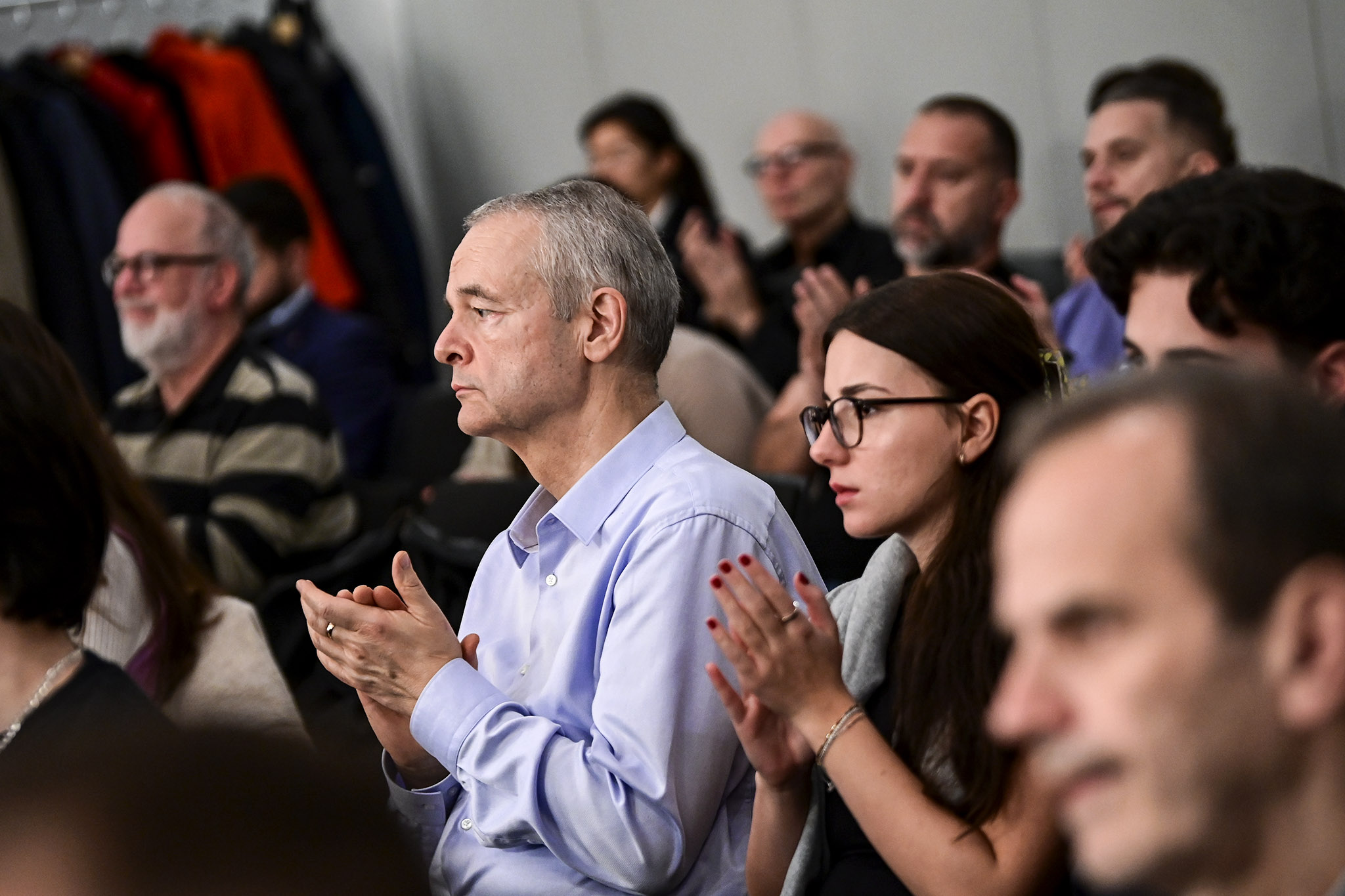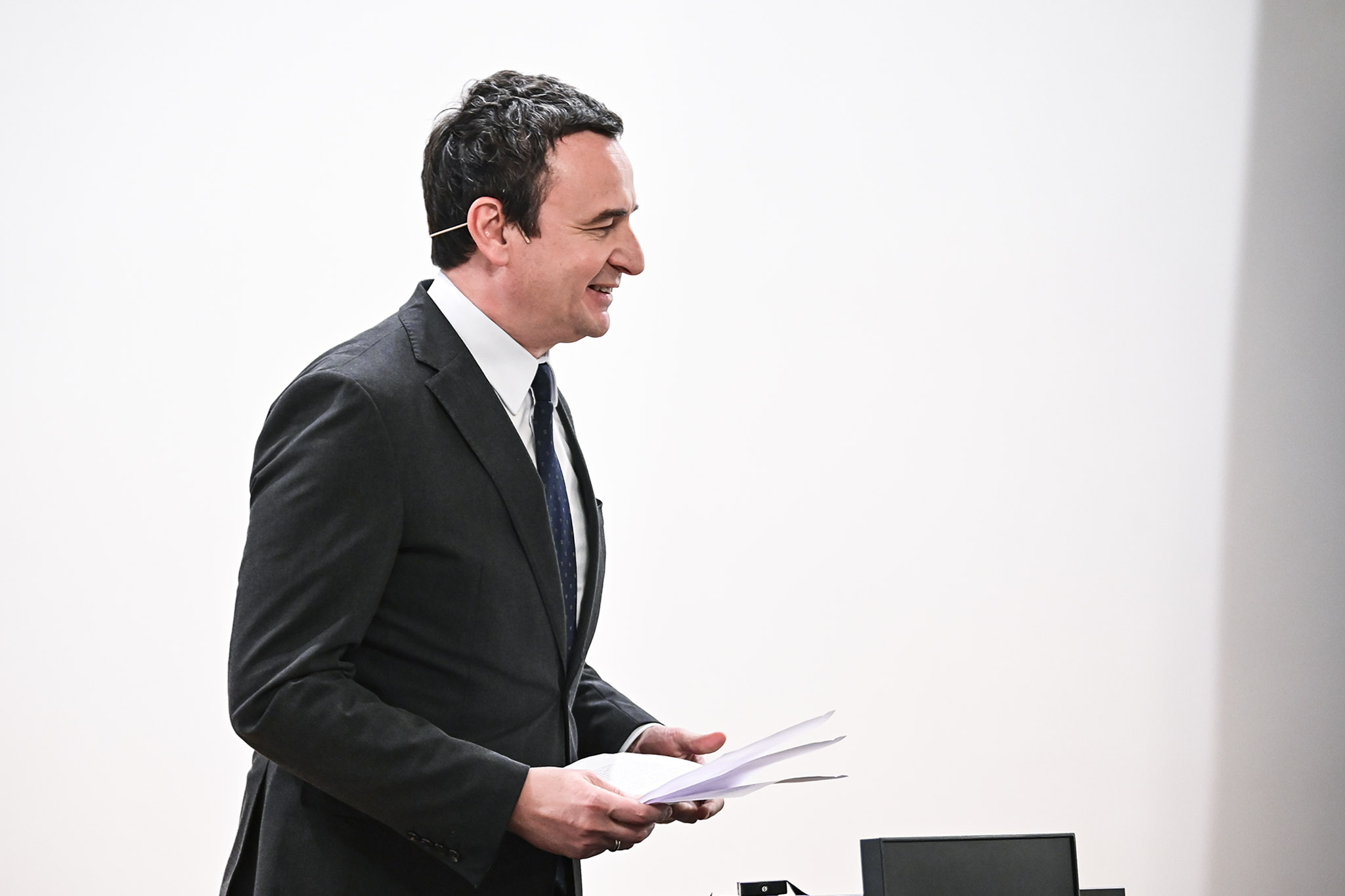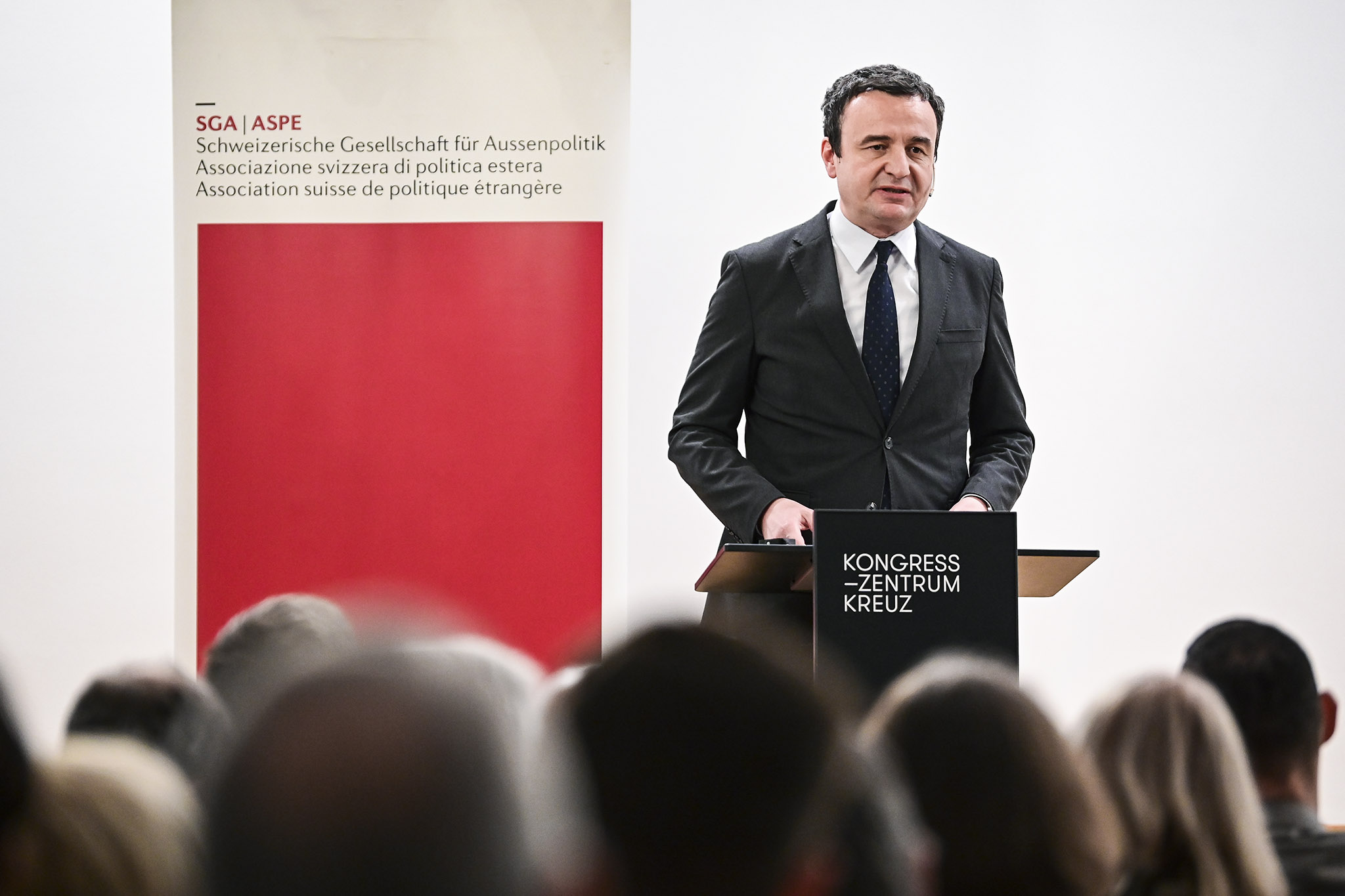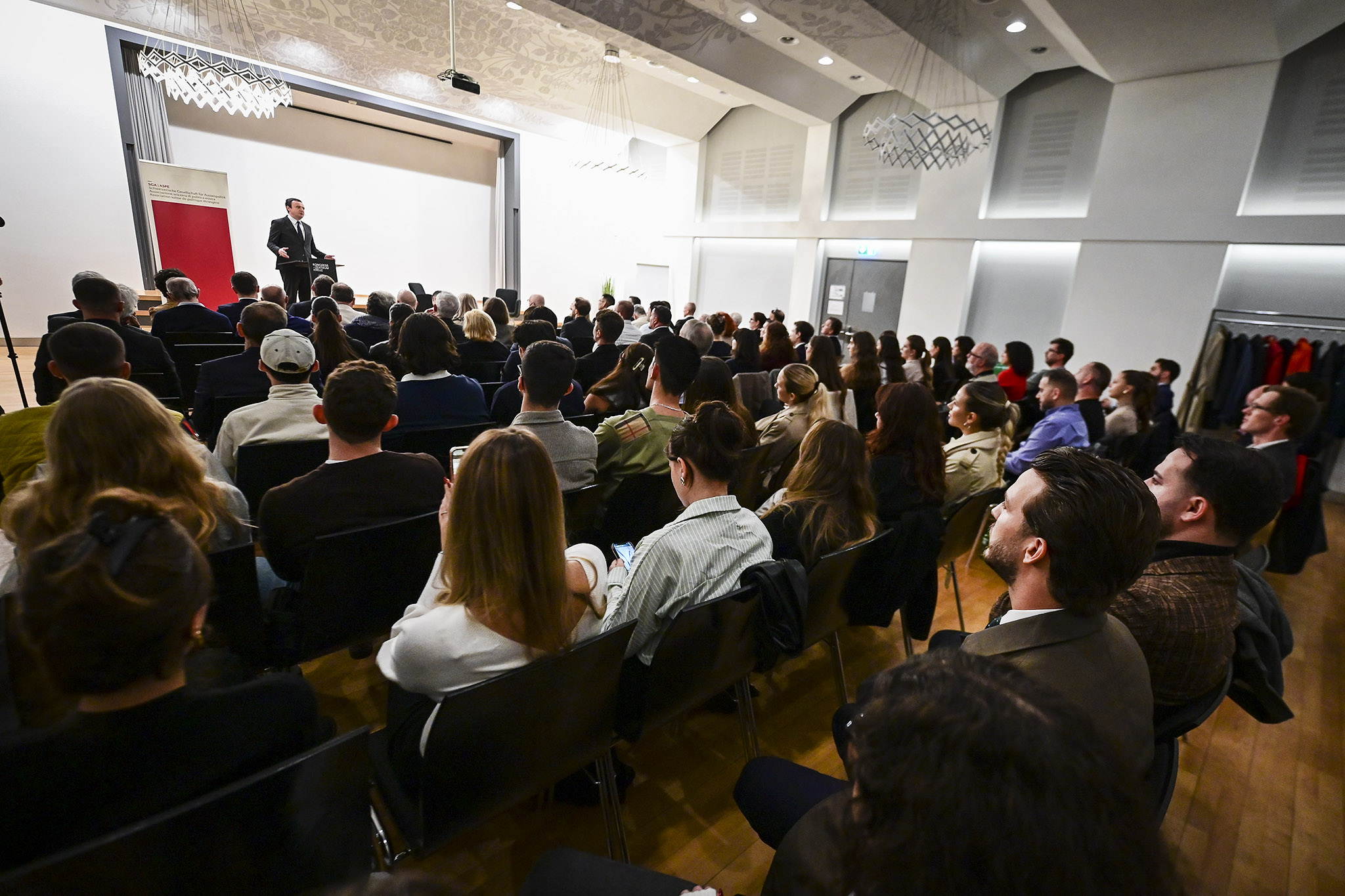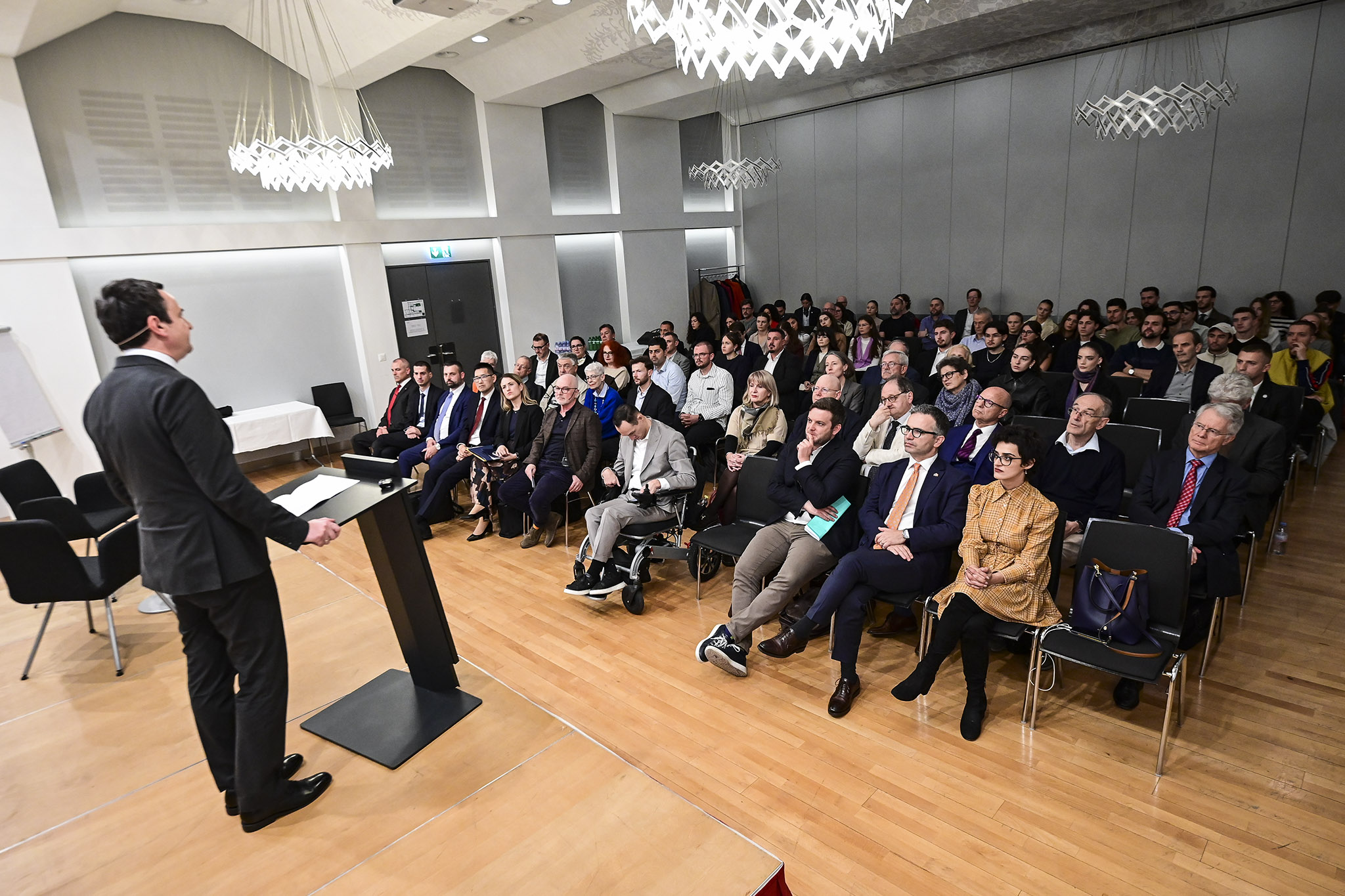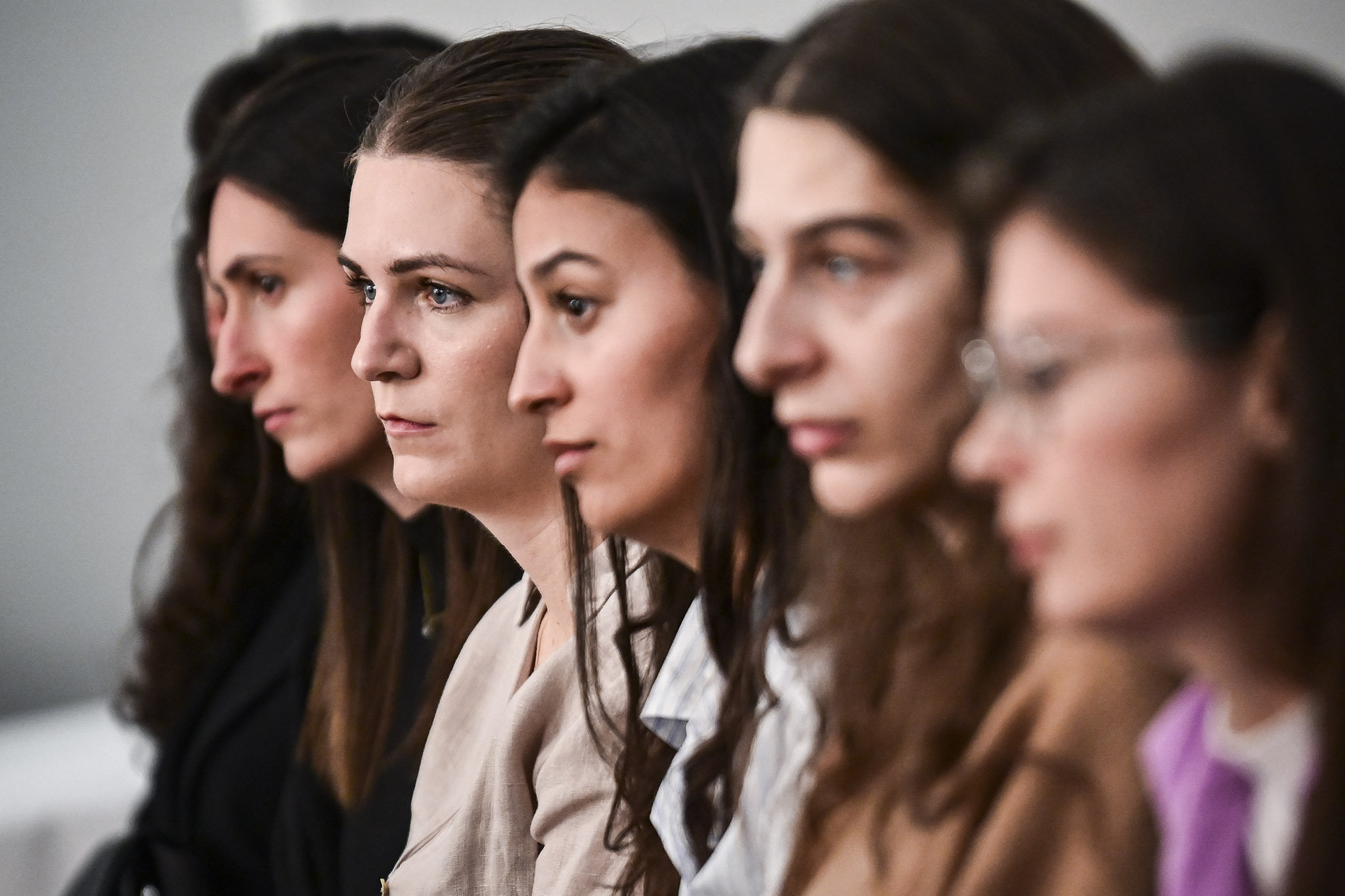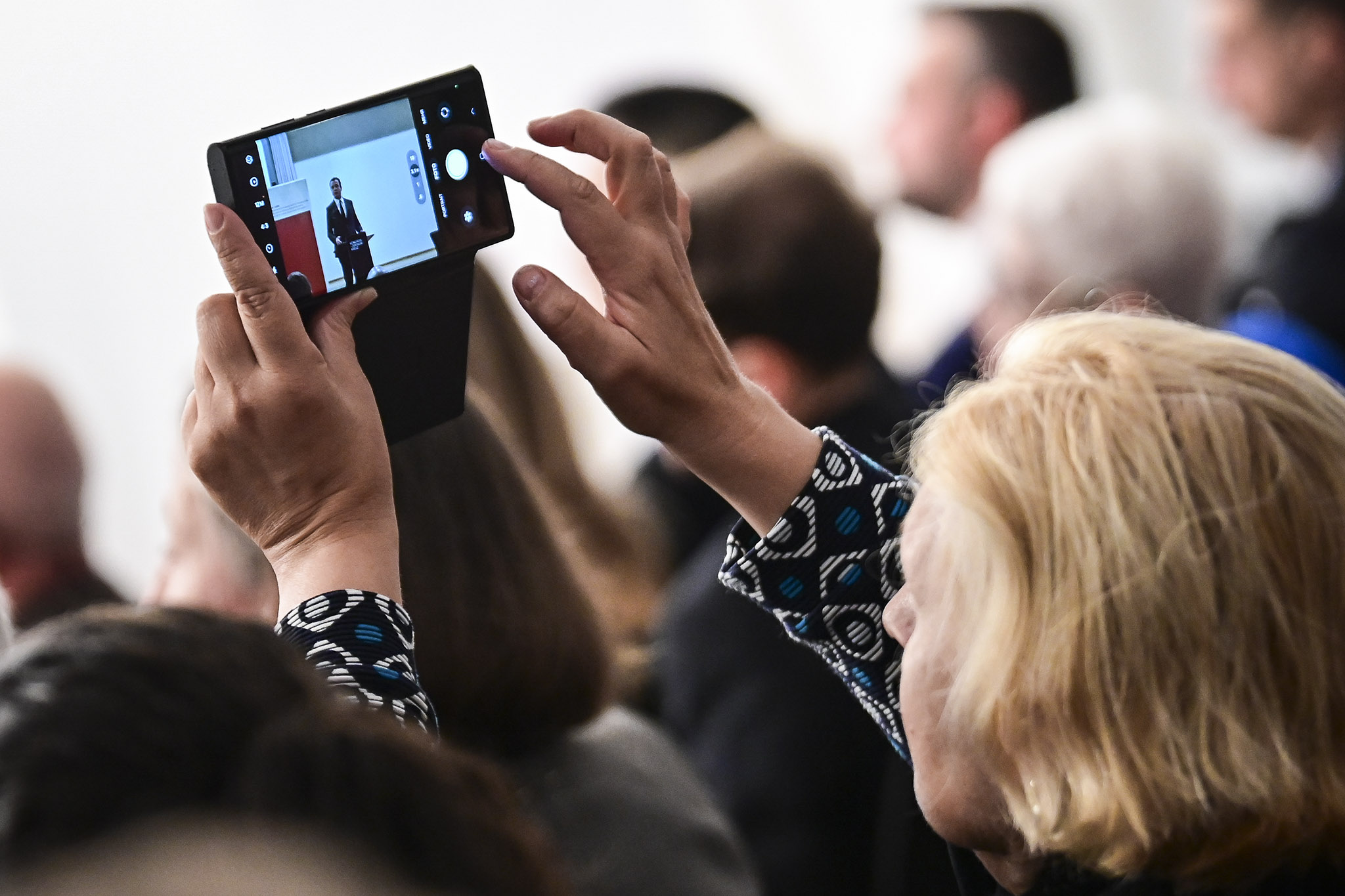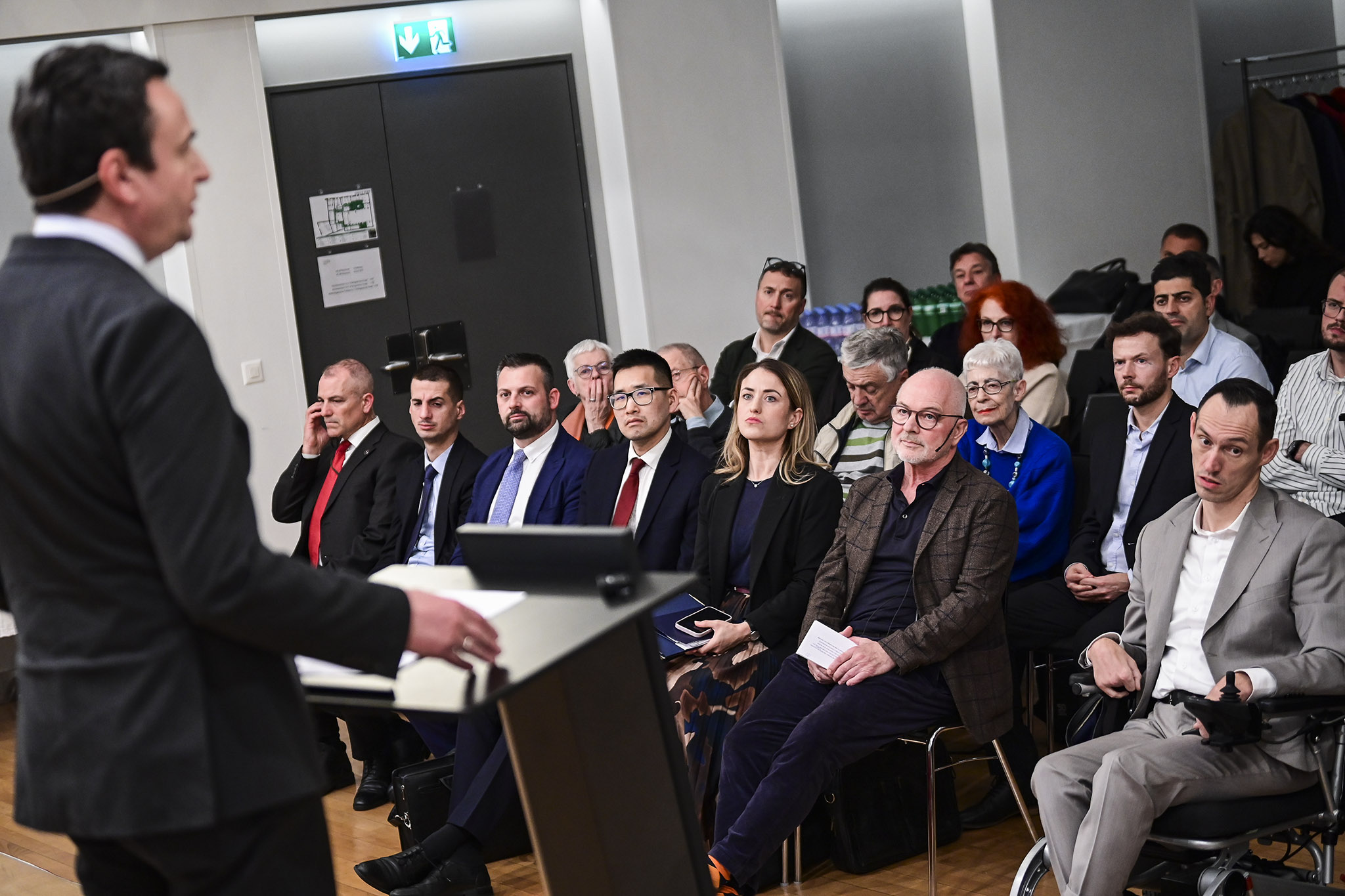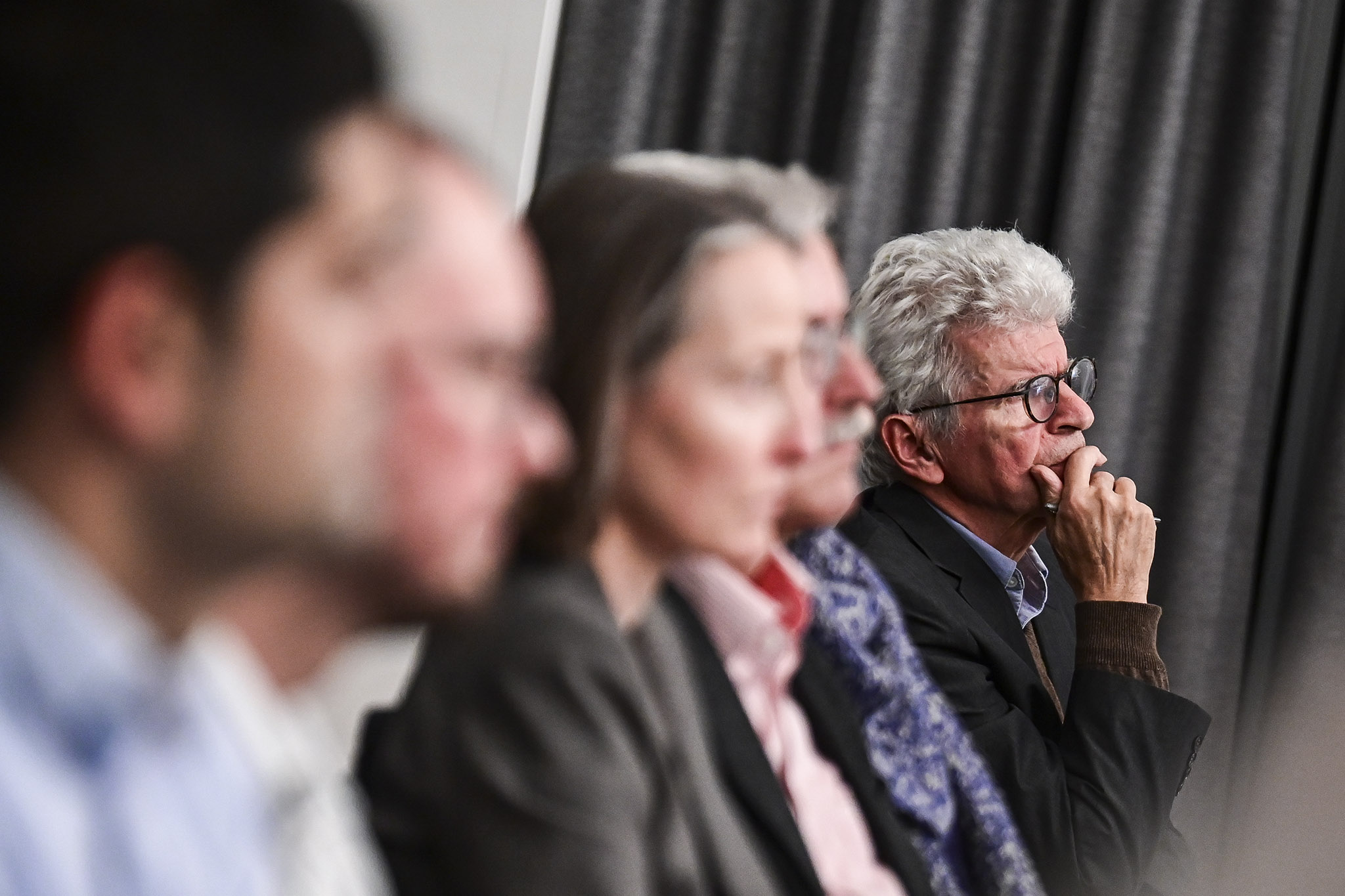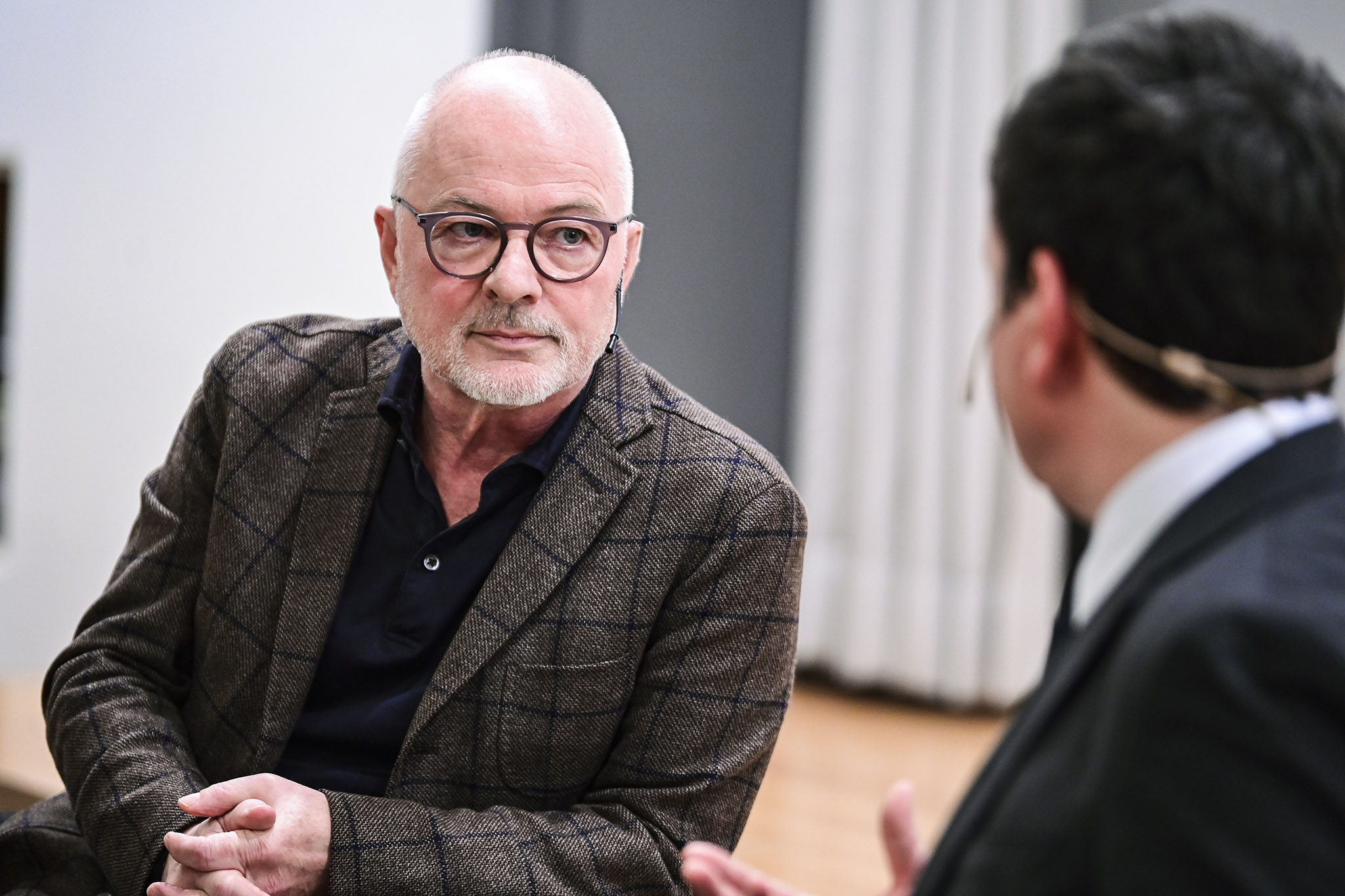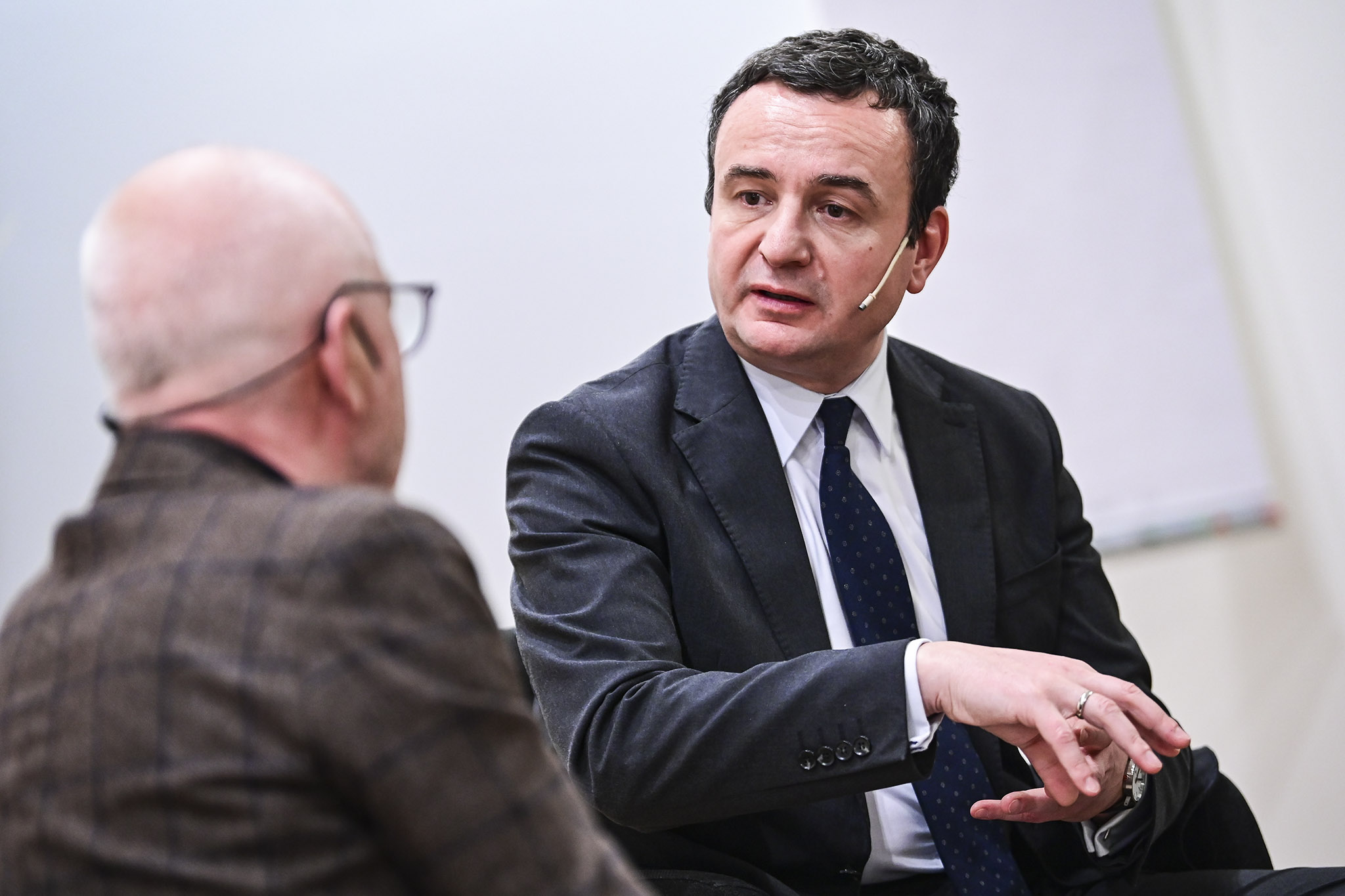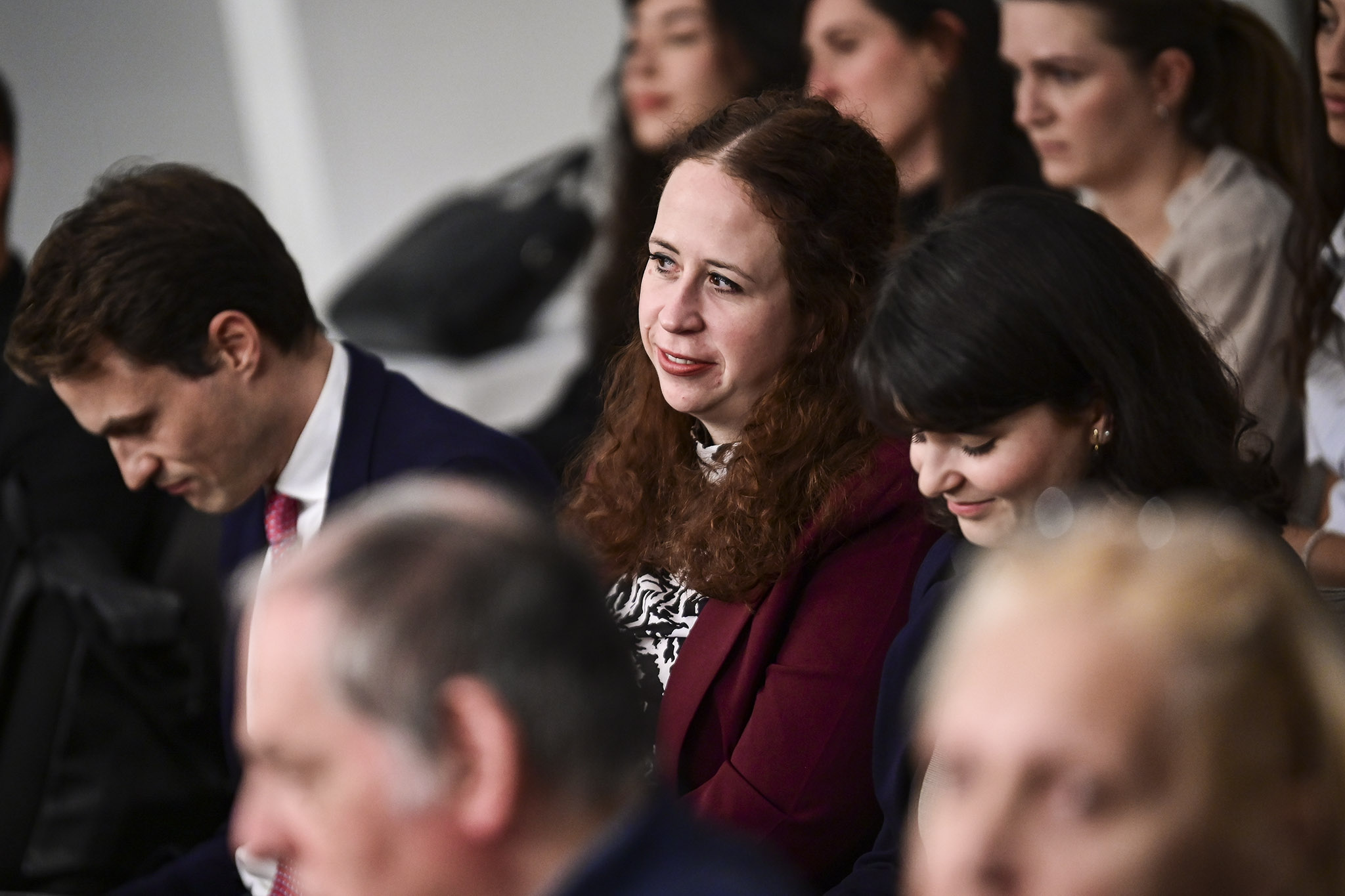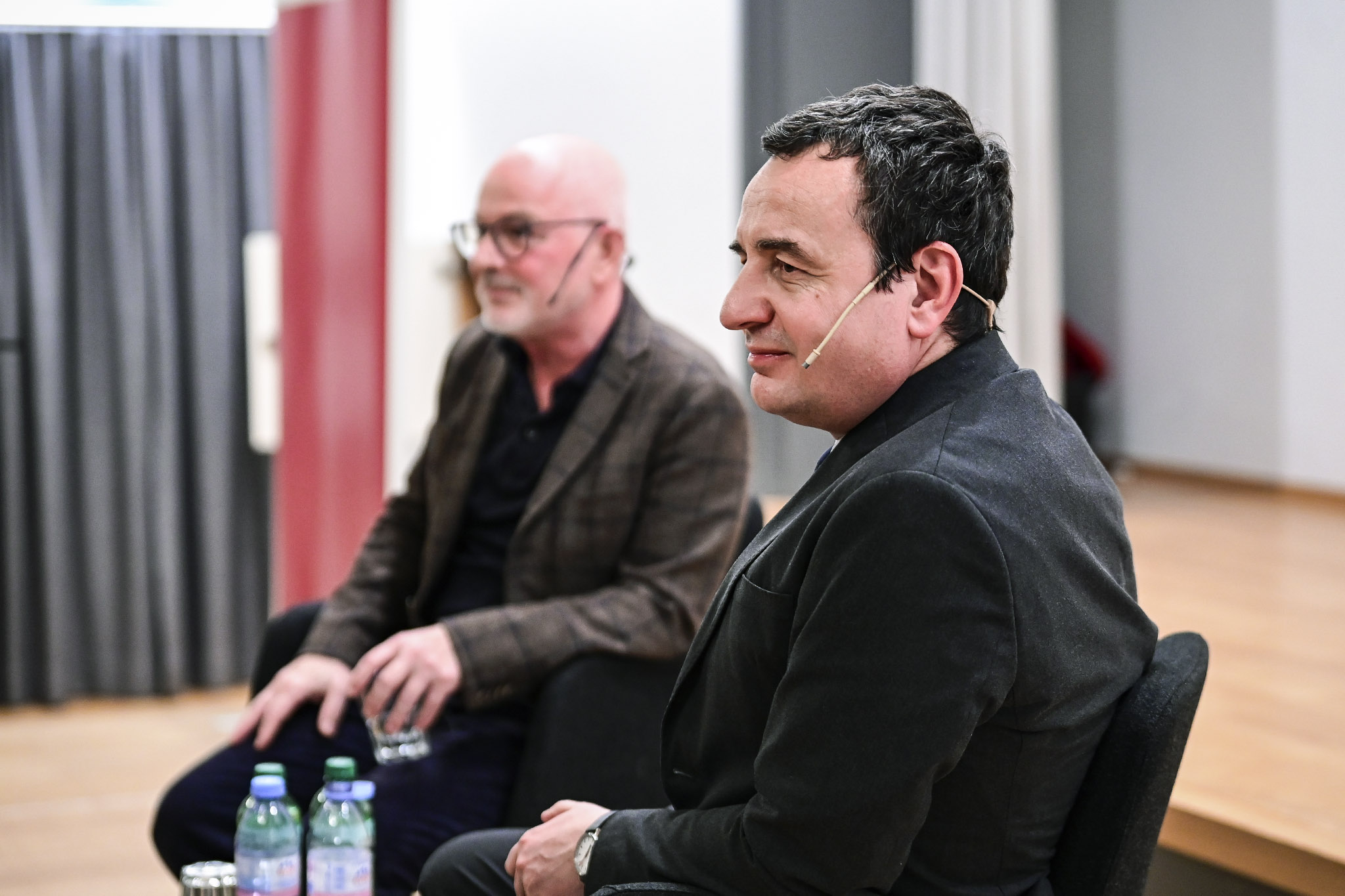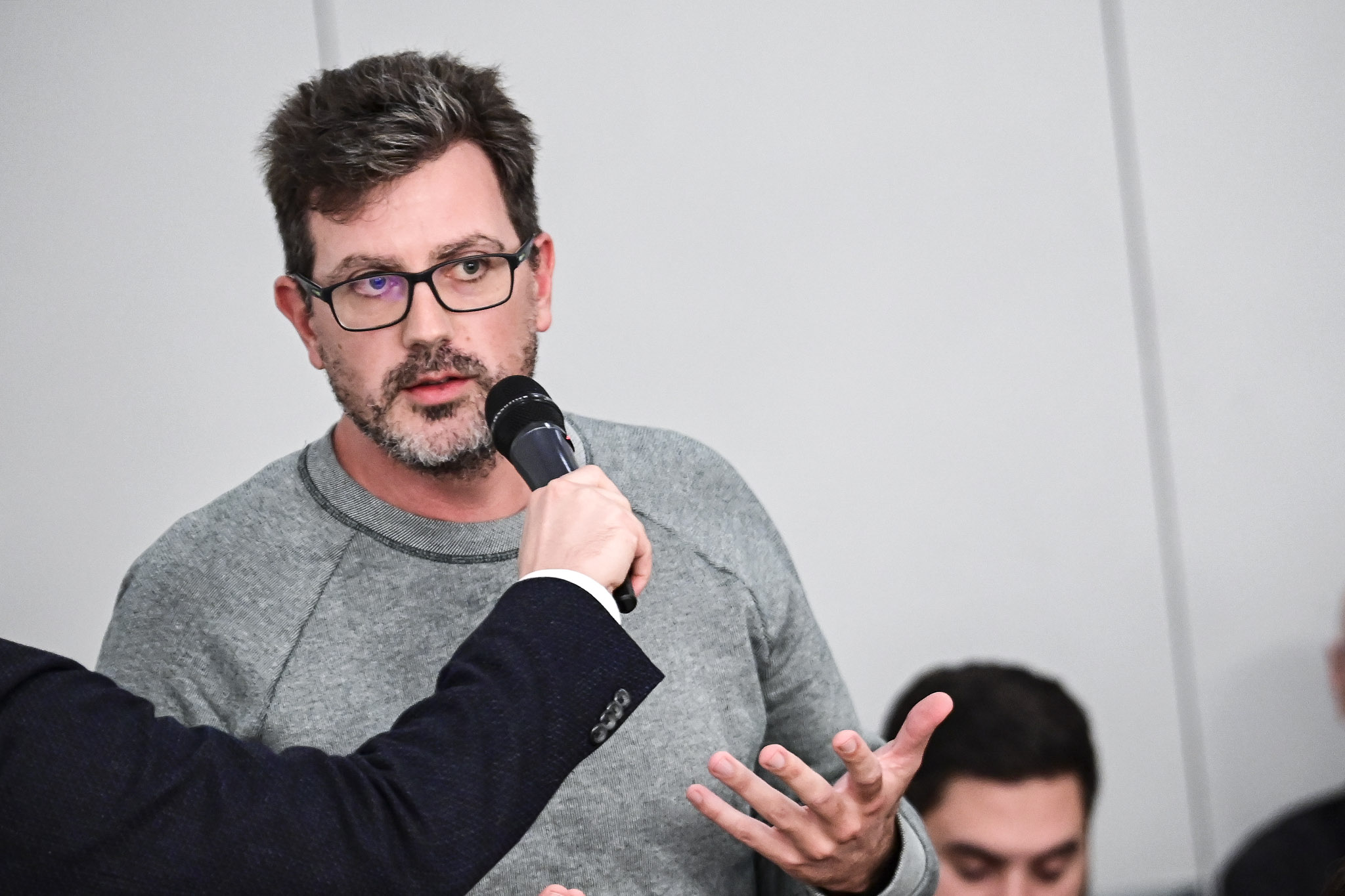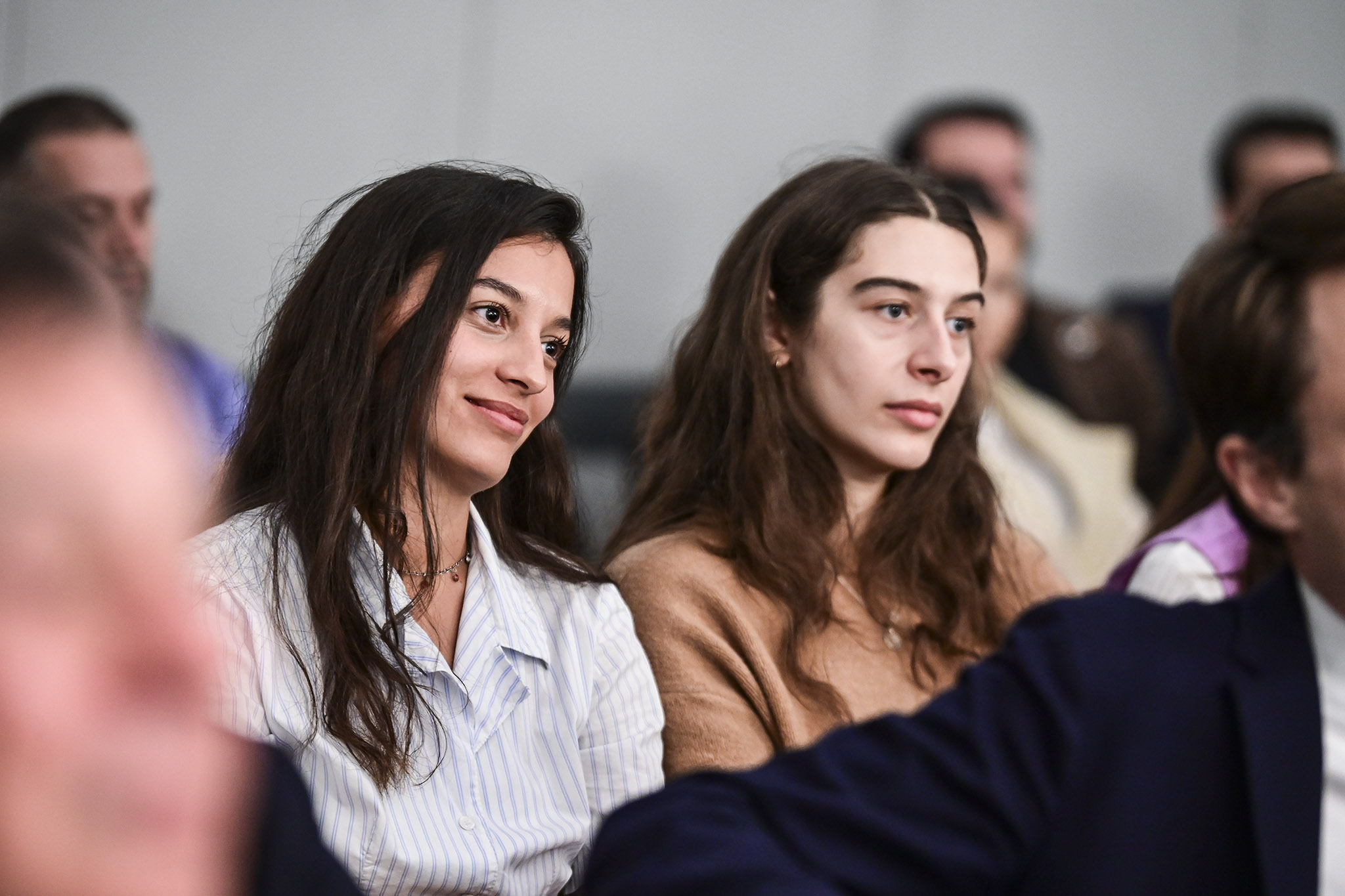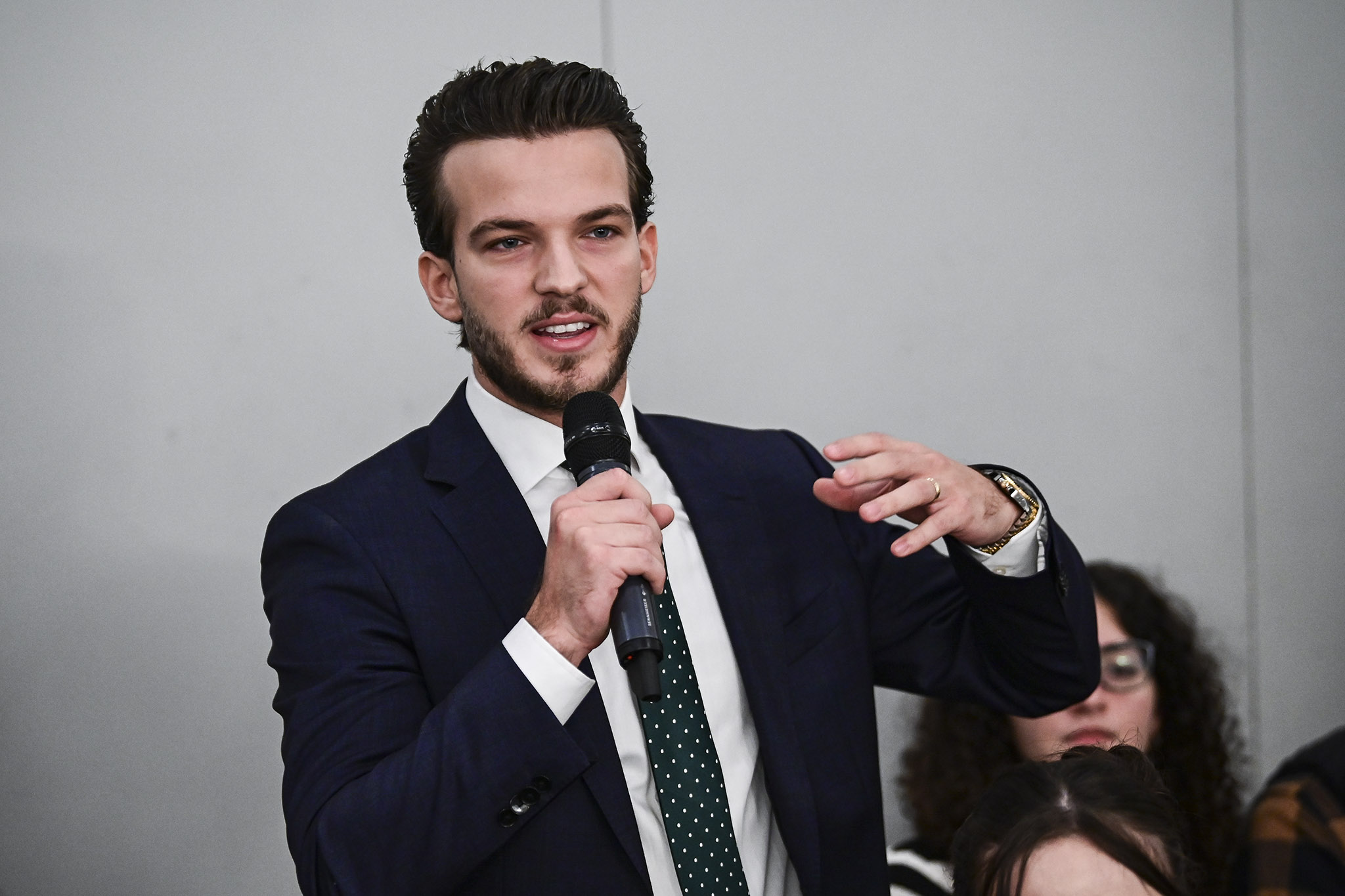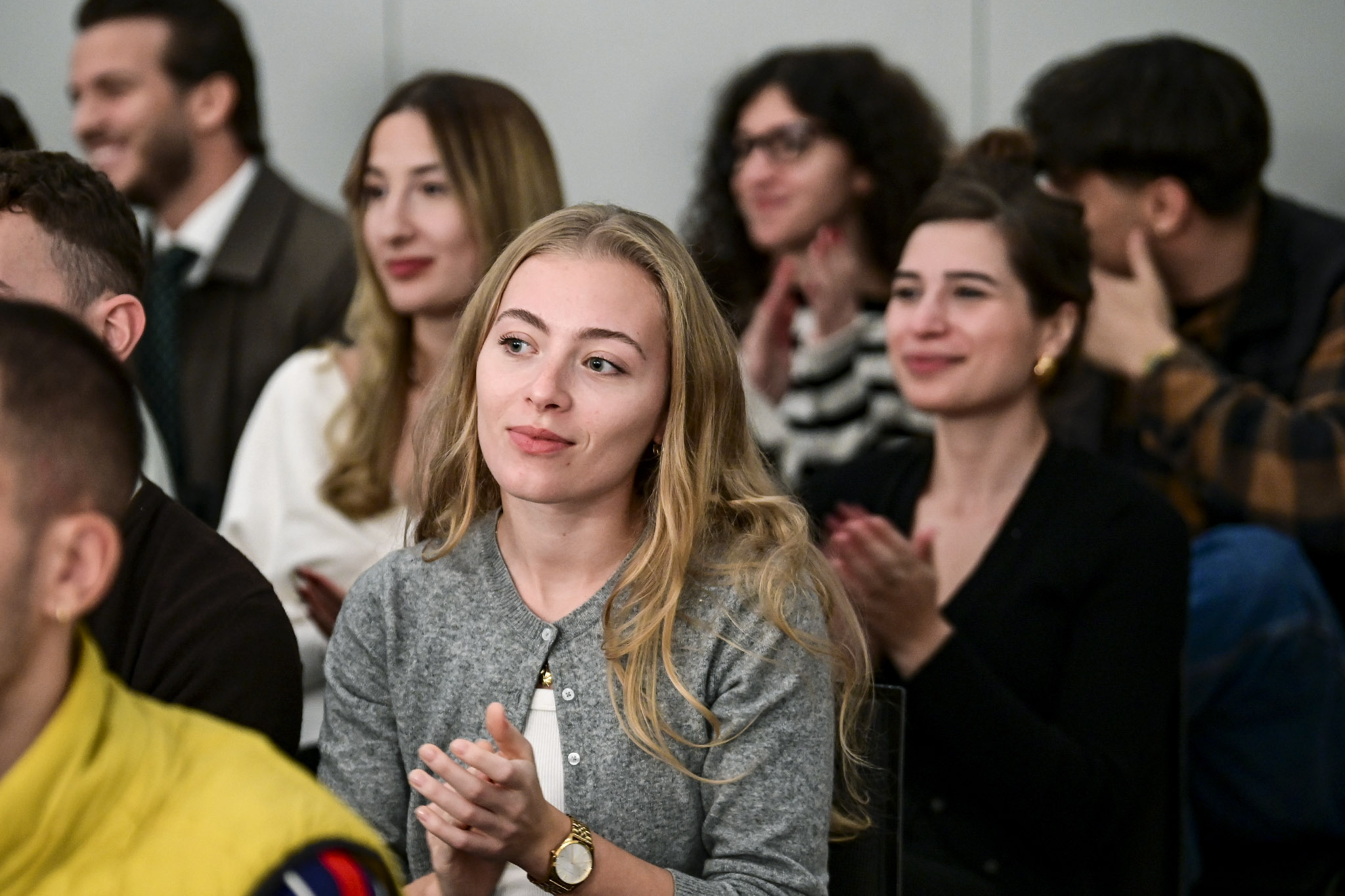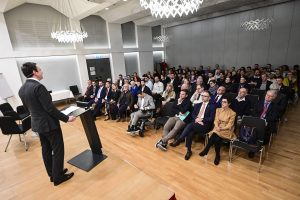Bern, 1 Switzerland November, 2024
The Prime Minister of the Republic of Kosovo, Albin Kurti, during his two-day stay in Switzerland, was invited for an address and discussion by the Swiss Society for Foreign Policy, accompanied by a conversation with the foreign policy editor of NZZ, Andreas Ernst.
Honored and grateful for the invitation to this discussion, the prime minister said at the beginning of his speech that Kosovo and Switzerland have a special relationship that exceeds diplomacy and is enriched by deep human ties. For many Albanians, Switzerland is the second home and for the second and third generation of Albanians there, it is their home and the place where they build their hopes and dreams, he added.
He spoke about the country’s progress in recent years in the economic field, employment measures and the reduction of unemployment from 25.8% to 10.7%, about the progress made in fighting corruption and establishing the rule of law, and the improvement in respecting civil liberties. and political rights.
In his initial address, Prime Minister Kurti also addressed relations with Serbia and the dialogue process facilitated by the European Union. He elaborated on the developments in this process, Serbia’s refusal to sign the Agreed Framework Agreement and its Implementation Annex and highlighted the ongoing violations by Serbia which culminated in the letter of former Serbian Prime Minister Ana Brnabic sent to the European Union in which it is said that Serbia will not respect the territorial integrity of Kosovo, which practically means withdrawing from the Basic Agreement and its basic principles.
He also drew attention to the dangers of expanding economic and political influence of Russia and China in the region. On this occasion, the prime minister emphasized that it is essential for Kosovo and the entire Western Balkans to remain anchored in the European community of values, and that this commitment is not only for economic growth – but is about preserving democracy and freedom.
“I envision a Europe where the Western Balkans is fully integrated, not only economically but also culturally and socially. A Europe strong enough to resist external pressures, in defense of all its citizens. A Europe where our young people see a future they can believe in and where they can fulfill their dreams. The following years will be decisive in determining the pace of EU integration”, said the Prime Minister.
The Foreign Policy Strategy of Switzerland 2024-2027 reflects many of the values and objectives that Kosovo also has, the Prime Minister emphasized. Maintaining security, prosperity and independence in the face of challenging global conditions, prioritizing support for a stable Europe, promoting multilateralism and pursuing an active peaceful policy – these are principles that match our vision for the Western Balkans, the Prime Minister highlighted in his address.
He called for Switzerland to continue supporting Kosovo in its membership in international organizations and multilateral cooperation, which for countries like us are essential to achieve economic and security goals. The Prime Minister also expressed his gratitude to all those who have advocated and continue to advocate for Kosovo’s membership in organizations in which it is not yet a member, especially the Council of Europe, the European Union and NATO.
Prime Minister Kurti’s complete speech:
Ladies and Gentlemen,
Mr. Jon Pult, esteemed host and President of the Swiss Society for Foreign Affairs,
Dear members of the diplomatic corps and political representatives,
Dear Andreas Ernst, my good old friend,
Dear friends in Switzerland,
It is an honor to be here with you today, and I warmly thank you for this invitation. Kosova and Switzerland have long shared a unique relationship—one that transcends diplomacy, enriched by deep human connections. For many Albanians, Switzerland is a second home, and for the second and third generations of Albanians in Switzerland, it is their first home—not only a place of refuge, but a land where they have built their hopes and dreams.
Today, we gather to discuss the Western Balkans—a region aspiring to join the European Union, yet still facing significant hurdles. The Western Balkans is not just a geographic area; it is a region steeped in a rich history, playing a crucial role in Europe’s stability during these times of geopolitical tension. My country has tirelessly implemented democratic reforms to align more closely with the European Union. We are pursuing these changes not merely to be let into the EU, but because we deeply believe in the union’s core values—liberal democracy, a market economy, rule of law, human rights, political pluralism and in particular multilateralism which exists in democratic world which came to defend us by stopping Serbian genocide in spring 1999.
Kosova has made significant strides in combating corruption, entrenching the rule of law, and improving respect for civil liberties and political rights. These achievements have been recognized and acknowledged by reputable institutions, including Transparency International, World Justice Project, Freedom House, V-Dem Institute, and more. Our economic progress over the same period of time has followed a similarly positive path. Kosova’s GDP growth has averaged 6.2% over the past three years, the highest in the region. If we compare with year 2019, which was the pre-pandemic year, our economy is almost 50% bigger than five years ago. This is partly the result of the highest ever amount of capital investments in Kosova history last year. But also in the same line FDI has also increased by 134% during our mandate thus far; and a report this August by fDi Intelligence, sponsored by the Financial Times, ranked Kosova 2nd in Emerging Europe — and 5th in the world — for attracting the highest level of FDI relative to GDP. From the first quarter of 2021, when we returned to office, to the first quarter of 2023, the unemployment rate fell from 25.8% to 10.7%. This has included a two-fold increase in youth employment, and direct support for the employment of 12 thousand women.
Our victory and our success in governance depends very much from three social categories: youth, women and diaspora. We won thanks to them and we did well thanks to them.
Despite this clear record of democratic and economic progress, the path to EU membership is steep and often appears to stall, unfortunately for reasons linked to the dialogue process with Belgrade. It is hampered by the actions of a regime that has been deliberately vague about its alignment—East or West, EU or BRICS, democracy or autocracy. But in reality, the current regime in Belgrade has long made up its mind; indeed, it has never wavered.
Dear esteemed colleagues and friends,
I am aware of what’s at stake. This is why our government in 2023 endorsed the Brussels Agreement with the Ohrid Implementation Annex, which anticipates de facto mutual recognition between Kosova and Serbia. This is a model taken from Willy Brandt’s Ostpolitik from 1972, live and let live, when two Germanys go seats in the UN nine months after, in autumn 1973. Things were on the right track, but in spite of agreeing to the text of the agreement Serbia never signed. I suspect that they said yes in order not to sign and later on regretted for saying yes. Ever since, the Serbian government continues to violet the agreement, and all this culminated with a letter sent by then-Prime Minister Ana Brnabic to the EU 27 saying that Serbia is not going to respect territorial integrity of Kosova. Mid December last year, the Basic Agreement with the its implementation annex was something which was embraced on by Kosova, because Serbia withdrew from this agreement even though many EU capitals and Washington, D.C. did want to accept it. So Serbia said we are not going to accept and respect anymore this agreement, but this has not been accepted and respected by the Brussels and Washington, D.C.
And regrettably, I must dispel any optimistic views one might have about Serbia’s willingness to reform itself. As long as its authoritarian elite continues to propagate misinformation, mobilize troops along our border, and refuse to prosecute terrorists who killed our police sergeant a year ago in Basnjka, Zvecan, Serbia will always pose a grave danger to the security not only of Kosova but also of other neighboring countries standing in the way of the “Greater Serbia” project, that now they call “Serbian World”, namely Montenegro and Bosnia and Herzegovina being also harassed in addition to Kosova.
Moscow will be the first to join this concert of disruption and destruction. Russia but also China have expanded their influence in the region, both economically and politically. Russia utilizes historical and cultural connections to exert its power, appealing to the deep-seated spirituality of the Serbian people, who are closely tied to the Russian Orthodox Church, while China uses investments and loans to solidify its influence. These influences destabilize the region and create a strong disincentive against democratic progress.
For Kosova and the entire Western Balkans, it is crucial to remain anchored in the European community of values. This commitment is not only about economic growth—it is about safeguarding democracy and freedom. We envisage the Western Balkans growing as a stable, sovereign, and fully integrated part of Europe—not as a geopolitical chessboard for external powers. Western Balkans in Europe. With the inclusion of Western Balkans into the EU, it is the European Union that becomes Europe.
Russia sees the region exactly like a geopolitical chessboard, especially as it searches for a way to distract the world’s attention and resources away from its illegal war in Ukraine.
In late May last year, when there were tensions in the north, foreign minister of Russian Federation, Sergey Lavror, who was attending a conference in Kenya made a public declaration saying that in that part of the planet, one block cannot dominate the other, and he added that the solution should be geopolitical. So not political, not legal, not social, not economic, not European, not principled, but geopolitical.
I envision a Europe where the Western Balkans is fully integrated, not just economically but also culturally and socially—a Europe robust enough to resist external pressures, protective of all its citizens. A Europe where our youth sees a future they can believe in and where they can achieve their dreams. The next few years will be pivotal in determining the pace of EU integration. And Switzerland, I believe, can take a bold stand in this journey.
Switzerland’s Foreign Policy Strategy 2024–2027 reflects many of the values and objectives we hold dear in Kosova. With its goals of maintaining security, prosperity, and independence under challenging global conditions, Switzerland prioritizes supporting a stable Europe, promoting multilateralism, and pursuing an active peace policy—principles that align with our vision for the Western Balkans.
I am convinced that especially you in this audience understand that a democratic and prosperous Western Balkans contributes to overall European security. Because of this, I would like to ask for your continued support for Kosova in international organizations and engagement in multilateral cooperation—this is essential for states like ours to achieve security and economic goals. We would also appreciate your advocacy for Kosova’s accession to those organizations in which our membership is still pending, especially in the Council of Europe, the EU and NATO. We need this from our friends, we need this from Switzerland. And we count on Switzerland because if there is one country that we can say that recognized us before we declared independence is actually Switzerland. I remember very well in 2007, then madam president Micheline Calmy-Rey said “independence of Kosova”, and we declared independence one year after. Switzerland is a proof that Kosova had an embassy before it got independence, and that is our diaspora. Our diaspora was like our embassy without us yet being independent. I think that it is this country and it is this specific relation we have, human and political, that we count in the near and inter future.
Given the significant Kosovar diaspora in Switzerland I would say that support for our country is a natural testament to our intertwined communities and shared futures. Indeed, we have much in common. As two states united around the same set of democratic values and principles, we must stick together. The solutions nowadays should be at least continental. It is not possible to have national solutions anymore. After Russian aggression in Ukraine, it is not possible. 22nd of February 2022 is the time when Russia aggression started a new chapter in Europe and we have to act according to it with more solidarity, firmness and clarity. From 9/11 (2001) until February 2022, one could say that these two decades were decades of international terrorism and finances, with global financial crisis in the middle. But now, geopolitics and history in back. Now we have to think of ourselves through thinking of our continent. Only when we stick together with solidarity of democracies being deeper and higher than solidarity autocrats and extremists, we can defeat them both and answer to all those who threaten unity and security of Europe with more democracy, active citizenry and collaboration between democracies and societies who believe in human rights and in rule of law.

